Transitional bathrooms masterfully blend the timeless elegance of traditional design with the clean, crisp lines of contemporary style. This popular aesthetic creates a serene and sophisticated retreat that feels both fresh and familiar, avoiding the starkness of modernism and the ornate nature of classic decor. The result is a balanced and harmonious space characterized by neutral color palettes, a mix of materials like natural stone and polished metals, and fixtures that offer simple yet refined silhouettes. This design approach provides lasting appeal, creating a comfortable and stylish sanctuary that won't feel dated in a few years, making it a perfect choice for any home.
1. Transitional Bathroom with a Freestanding Tub
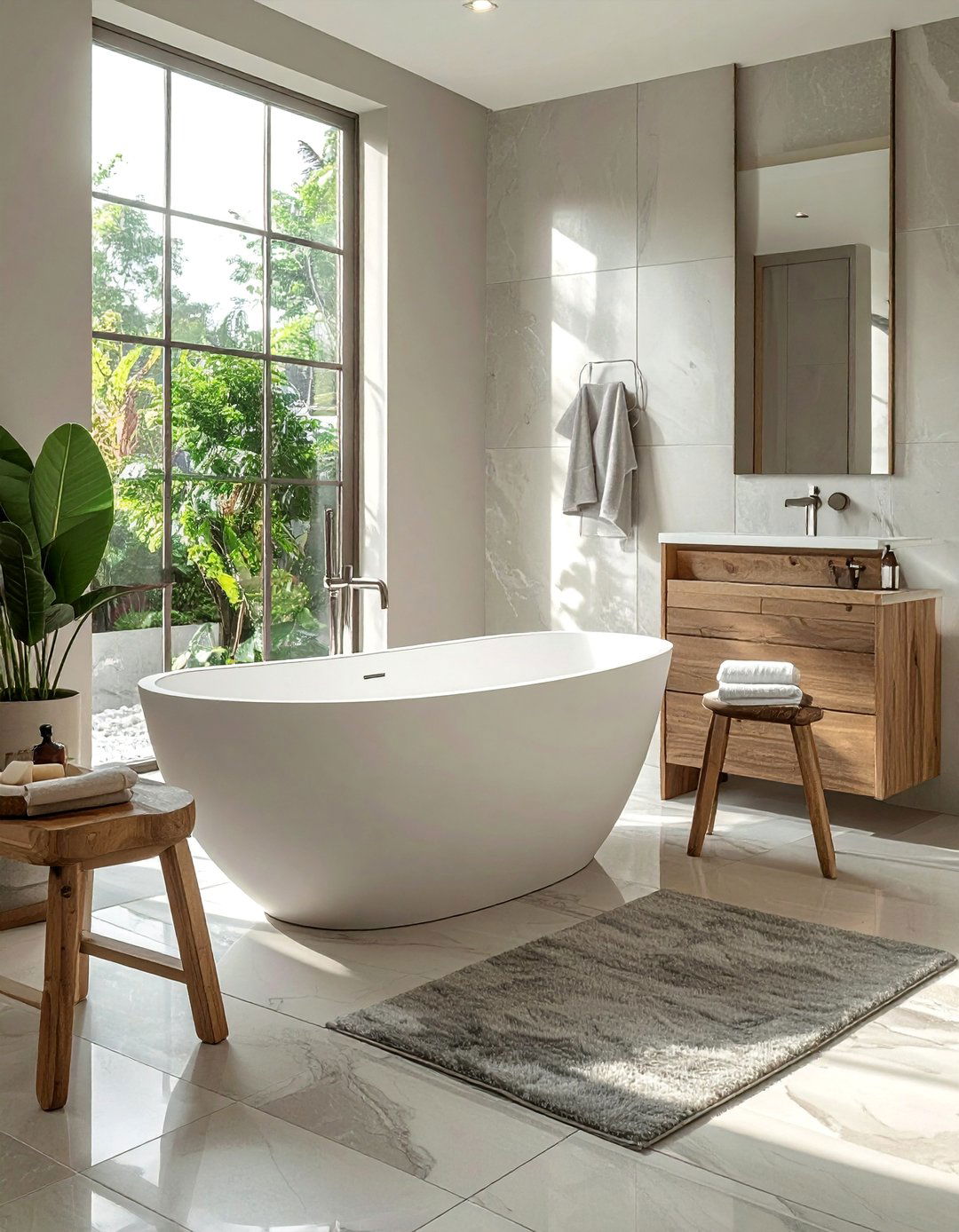
A freestanding tub serves as a stunning focal point in any transitional bathroom, effortlessly merging classic luxury with modern simplicity. Unlike built-in alcove tubs, a standalone model introduces an element of sculptural beauty and sophisticated elegance. Paired with a sleek, floor-mounted faucet in a finish like brushed nickel or matte black, it creates a clean, uncluttered look. The combination of the tub's classic shape and the modern fixture perfectly embodies the transitional ethos. Placed against a backdrop of neutral tiles or a subtle accent wall, the freestanding tub establishes a spa-like atmosphere, inviting relaxation and offering a high-end, custom feel.
2. Transitional Bathroom with a Shaker-Style Vanity
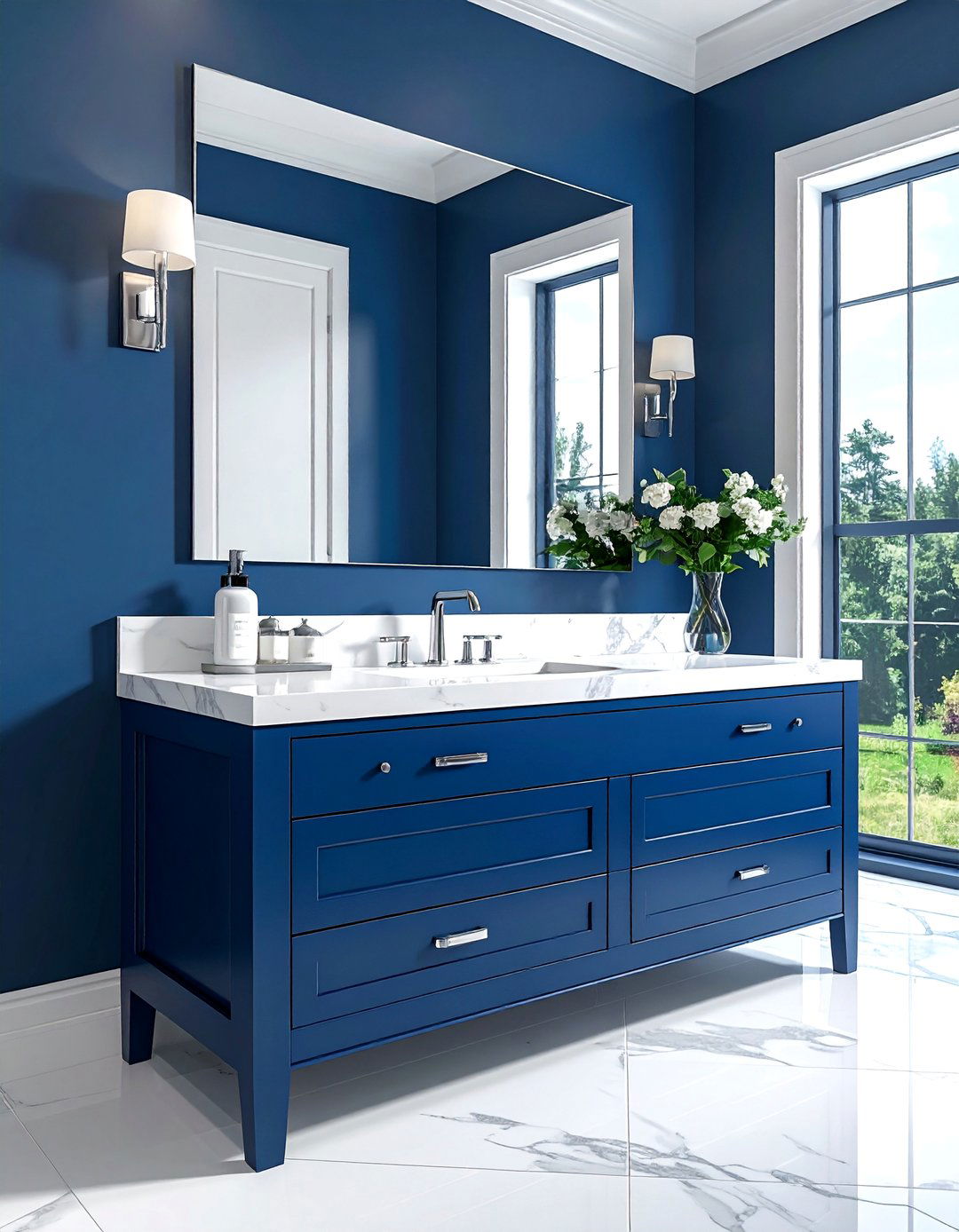
The Shaker-style vanity is a cornerstone of transitional bathroom design, celebrated for its clean lines, simple construction, and lack of ornate detailing. Its unadorned, functional aesthetic provides the perfect bridge between traditional craftsmanship and modern minimalism. Typically featuring recessed panel doors and simple hardware, a Shaker vanity offers ample storage without overwhelming the space. When painted in a neutral hue like soft gray, navy blue, or classic white and topped with a durable quartz or marble countertop, it exudes a timeless elegance. This choice provides a solid, grounding element that complements both modern fixtures and classic tilework, ensuring a cohesive look.
3. Transitional Bathroom with Marble Countertops
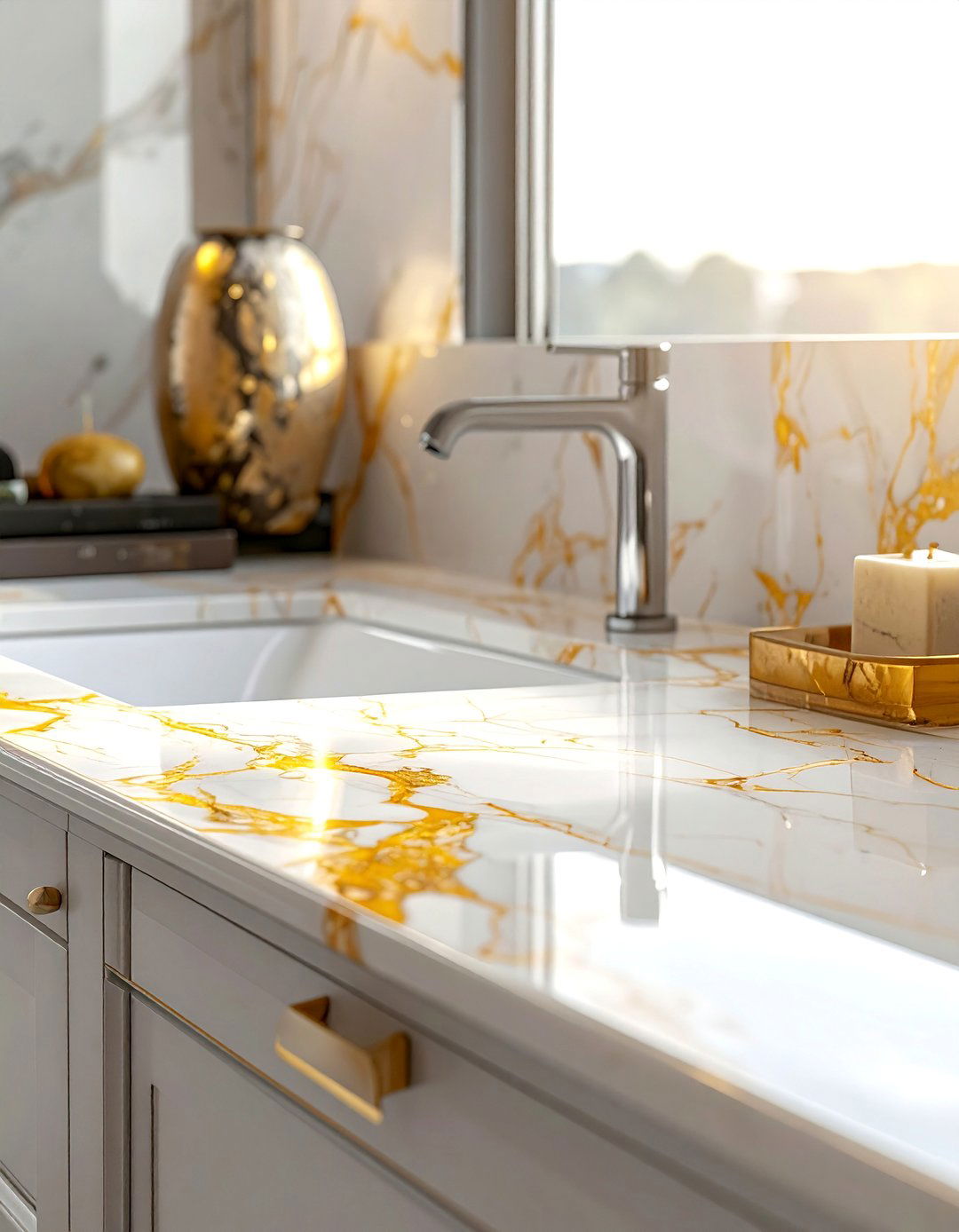
Marble countertops introduce a layer of undeniable luxury and classic appeal to a transitional bathroom. The natural veining and subtle color variations within the stone add organic texture and visual interest that no man-made material can perfectly replicate. Whether you choose a dramatic Calacatta Gold with bold, warm veins or a more understated Carrara with soft, gray patterning, marble elevates the entire space. It pairs beautifully with both modern, clean-lined vanities and more traditional cabinetry. Despite requiring some maintenance, its timeless beauty and ability to reflect light make the bathroom feel brighter and more spacious, solidifying its status as a premium design choice.
4. Transitional Bathroom with Hexagonal Floor Tiles
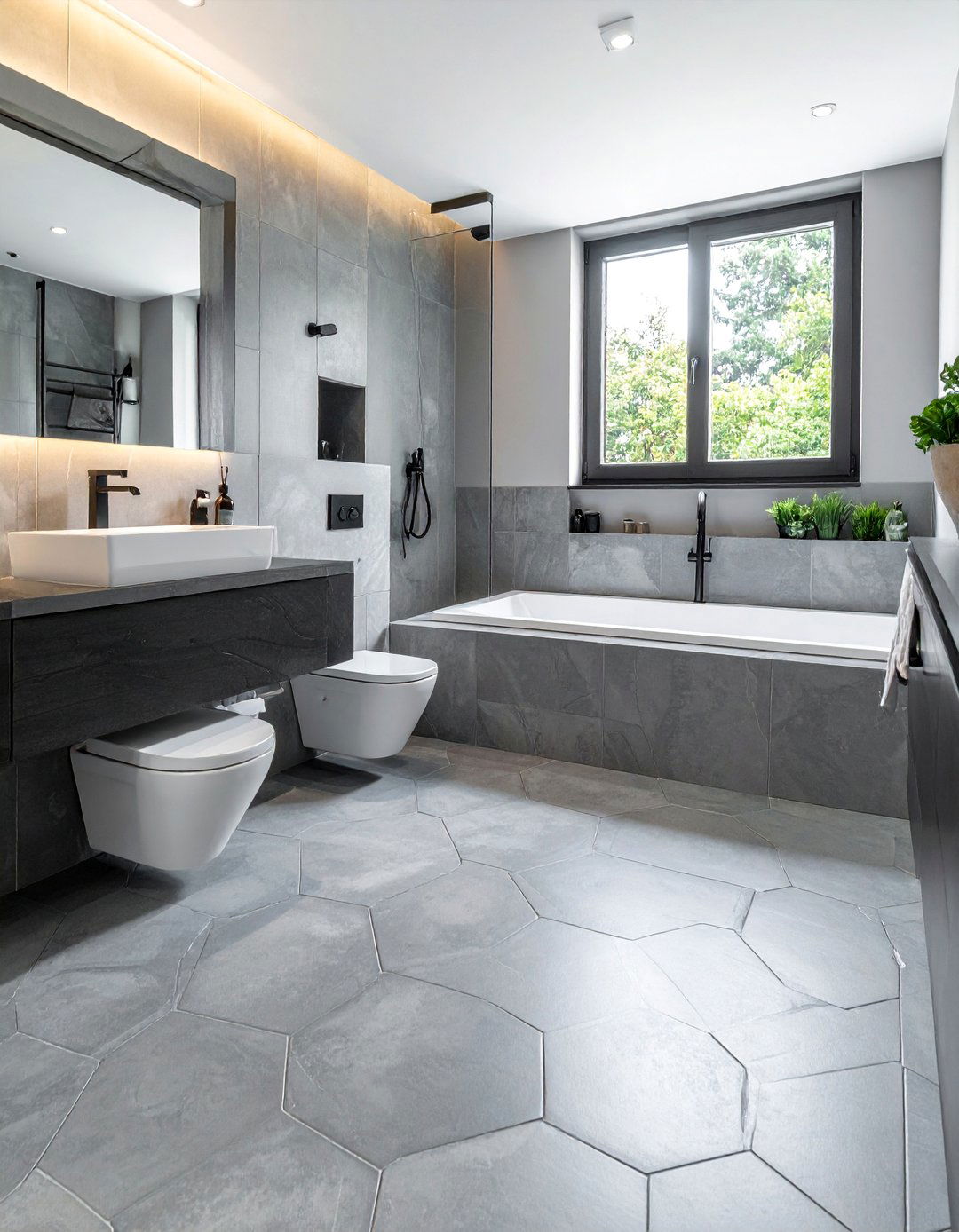
Hexagonal floor tiles offer a compelling geometric pattern that adds visual interest to a transitional bathroom without feeling overly trendy. This classic shape, rooted in historic design, gets a modern update when rendered in contemporary materials like porcelain or natural stone. Using larger format hex tiles can make a small bathroom feel more expansive, while smaller mosaic versions can create intricate, detailed patterns. A neutral color palette of gray, white, or black ensures the floor remains versatile, complementing both traditional vanities and modern fixtures. Adding a contrasting grout color can further accentuate the shape, creating a dynamic foundation for the room's design.
5. Transitional Bathroom with Subway Tile Wainscoting
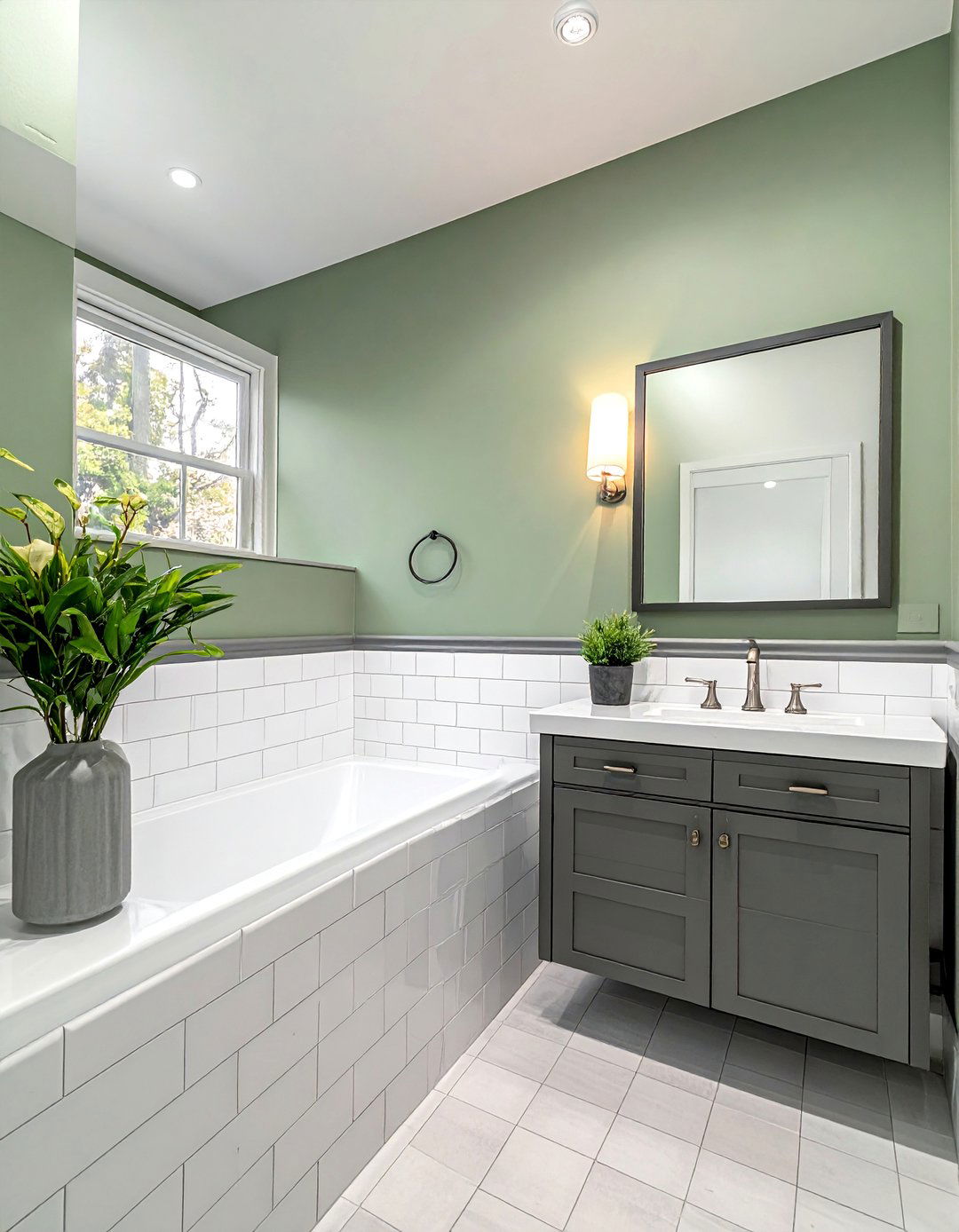
Subway tile wainscoting brings a dose of classic charm to a transitional bathroom while maintaining a clean, contemporary feel. Extending the tiles halfway up the wall creates a durable, water-resistant surface that is both practical and aesthetically pleasing. This traditional application of a simple, modern tile forges a perfect design bridge. Topped with a decorative chair rail or a simple pencil liner, it provides a clear visual separation, allowing the upper portion of the wall to be painted in a complementary color. This technique adds depth and architectural interest to the room, enhancing its character without sacrificing the clean lines central to transitional style.
6. Transitional Bathroom with Mixed Metal Finishes
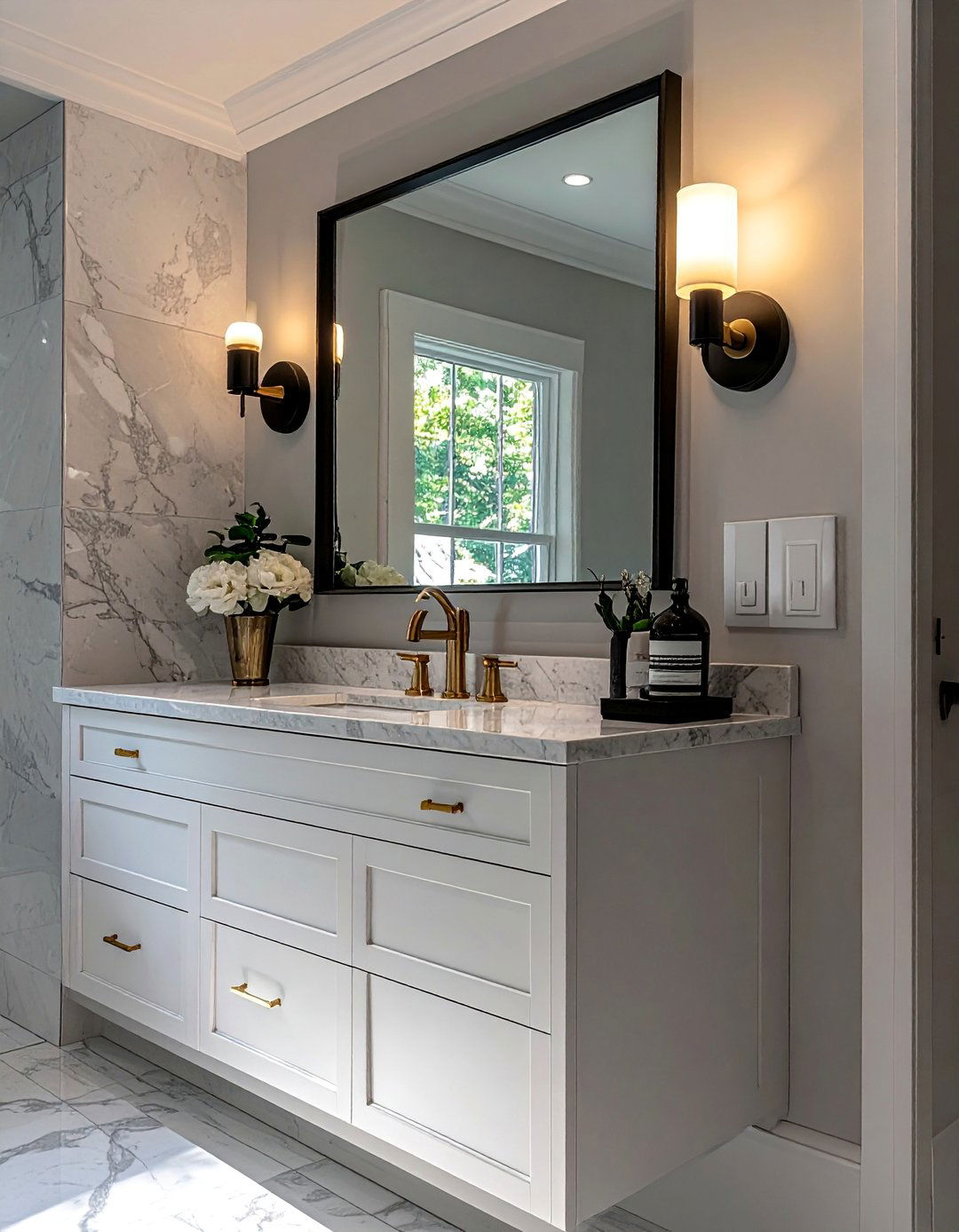
Incorporating mixed metal finishes is a sophisticated strategy for adding depth and a curated feel to a transitional bathroom. This approach breaks away from the matchy-matchy look of the past, creating a more dynamic and personalized space. Consider pairing a dominant metal, like brushed nickel for faucets and showerheads, with accent metals such as matte black for light fixtures and cabinet hardware. The key is to maintain balance; for instance, warm metals like brass or bronze can be used sparingly to add warmth against cooler tones like chrome or stainless steel. This thoughtful combination of finishes ensures the design feels layered and intentional.
7. Transitional Bathroom with a Frameless Glass Shower
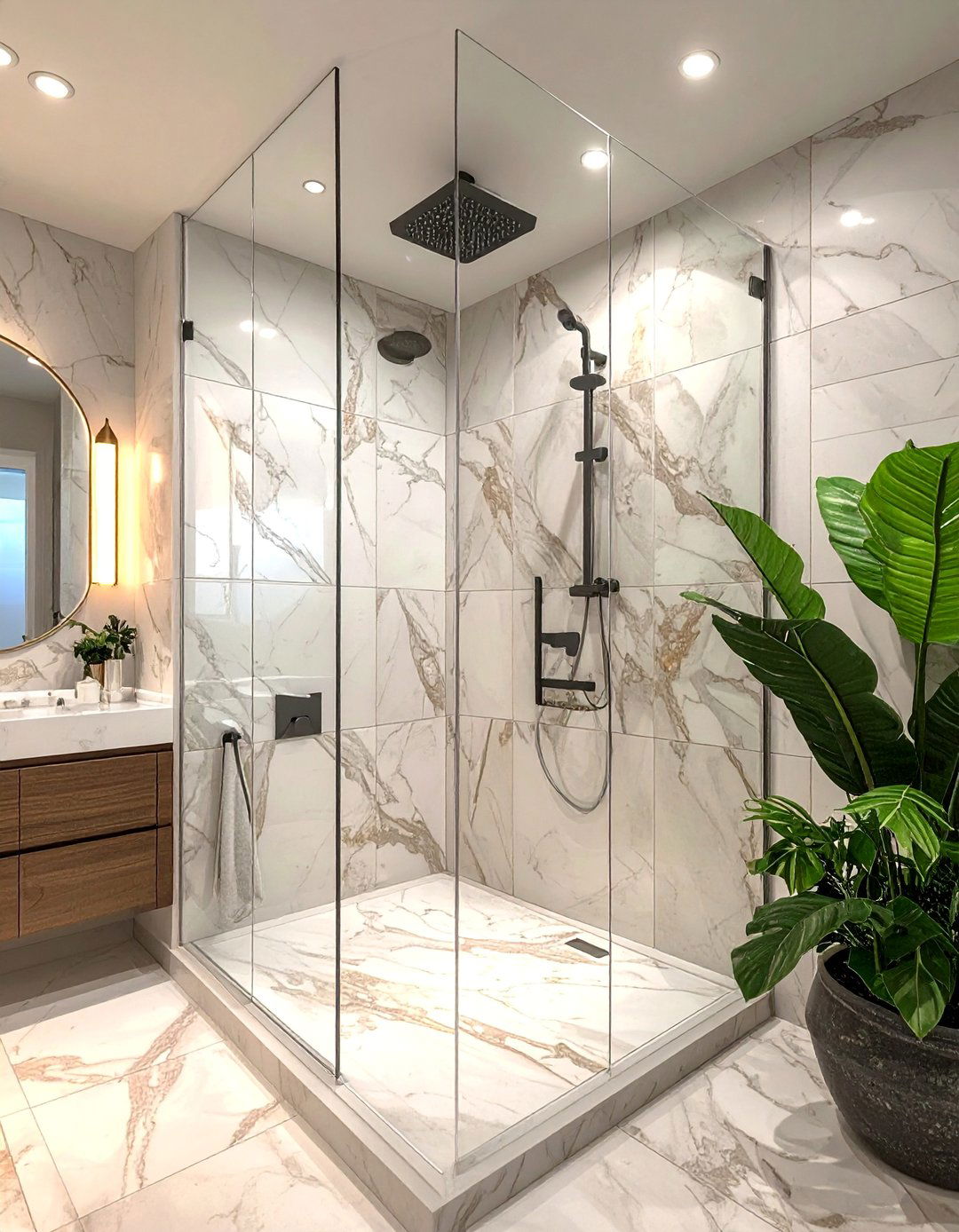
A frameless glass shower enclosure is a hallmark of modern design that integrates seamlessly into a transitional bathroom. Its minimalist construction, free of bulky metal frames, promotes an open and airy feel, making the bathroom appear larger and brighter. This allows the tilework within the shower to become a focal point, whether it’s classic marble, simple subway tile, or a subtle mosaic accent. The clean, unobstructed lines of the glass contribute to the contemporary side of the transitional aesthetic, while its understated presence ensures it doesn’t detract from the more traditional elements in the room, like a Shaker-style vanity or classic floor tile.
8. Transitional Bathroom with Polished Nickel Fixtures
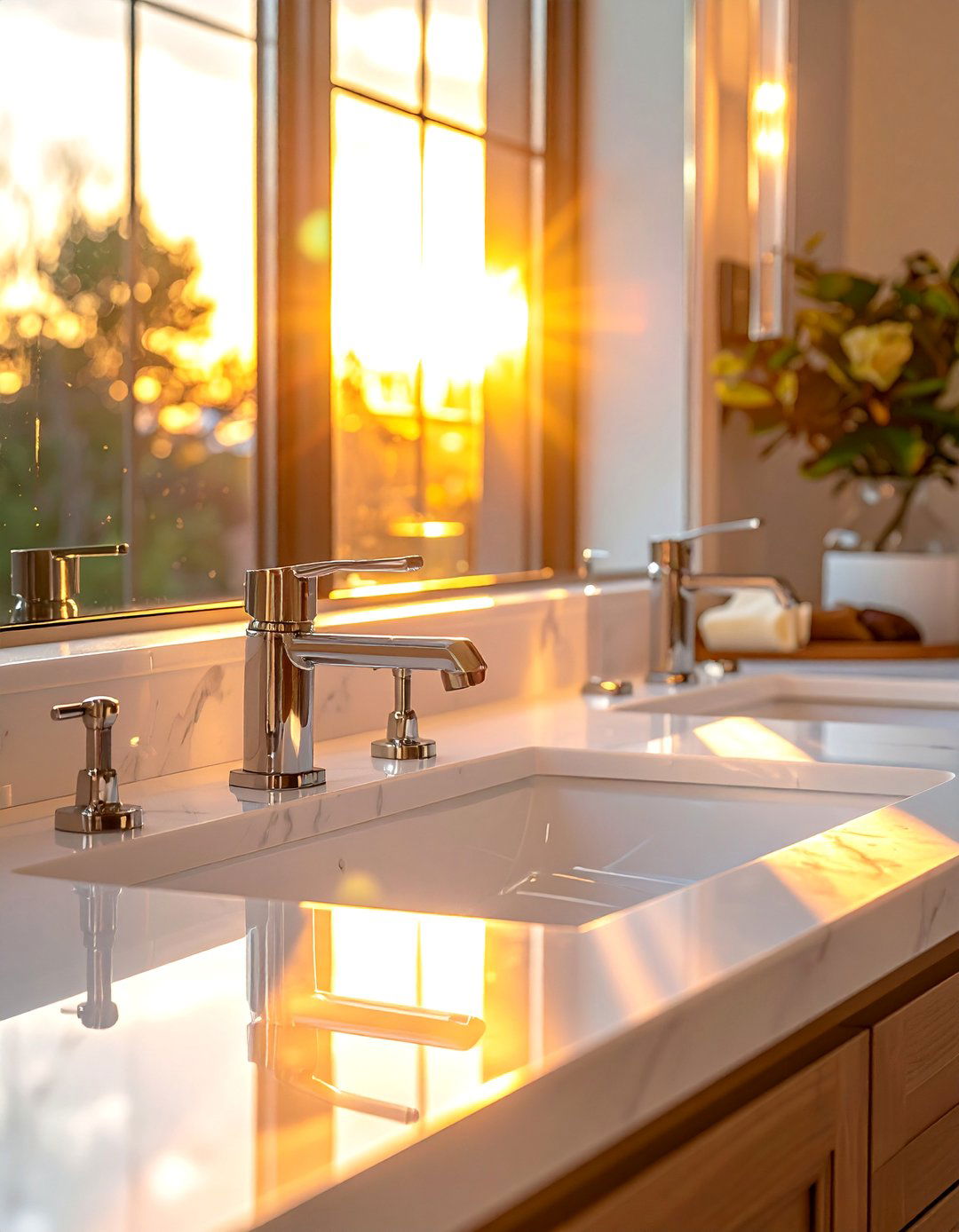
Polished nickel fixtures offer a warmer, richer alternative to chrome, making them an ideal choice for a transitional bathroom. This finish possesses a subtle golden undertone that prevents it from feeling as starkly modern as chrome, aligning perfectly with the style’s blend of classic and contemporary. Polished nickel has a timeless quality that pairs beautifully with both traditional silhouettes and sleek, modern faucet designs. It complements a wide range of materials, from classic Carrara marble to modern quartz countertops, and adds a touch of understated luxury. This versatile finish provides a sophisticated and cohesive look that elevates the entire space without being overly ostentatious.
9. Transitional Bathroom with a Neutral Color Palette
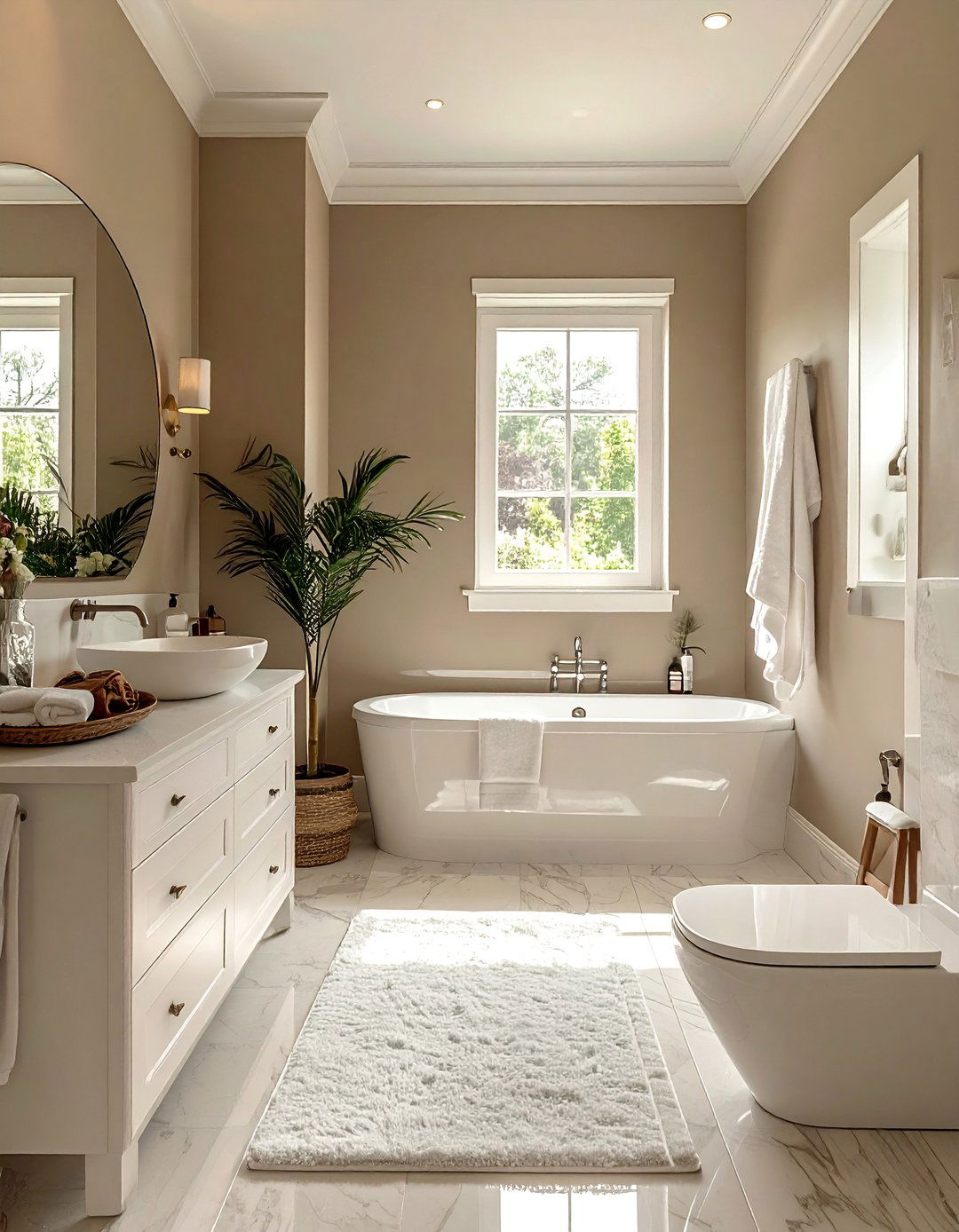
A neutral color palette provides the serene and sophisticated foundation for a successful transitional bathroom design. Shades of soft gray, warm beige, creamy off-white, and muted greige create a calming and cohesive backdrop that allows both modern and traditional elements to shine. This understated approach to color emphasizes the room's textures and forms, from the veining in a marble countertop to the clean lines of a Shaker vanity. An accent color, such as a deep navy or a soft sage green, can be introduced through towels, accessories, or a painted vanity to add depth and personality without overwhelming the tranquil atmosphere of the space.
10. Transitional Bathroom with Wood-Look Porcelain Tile
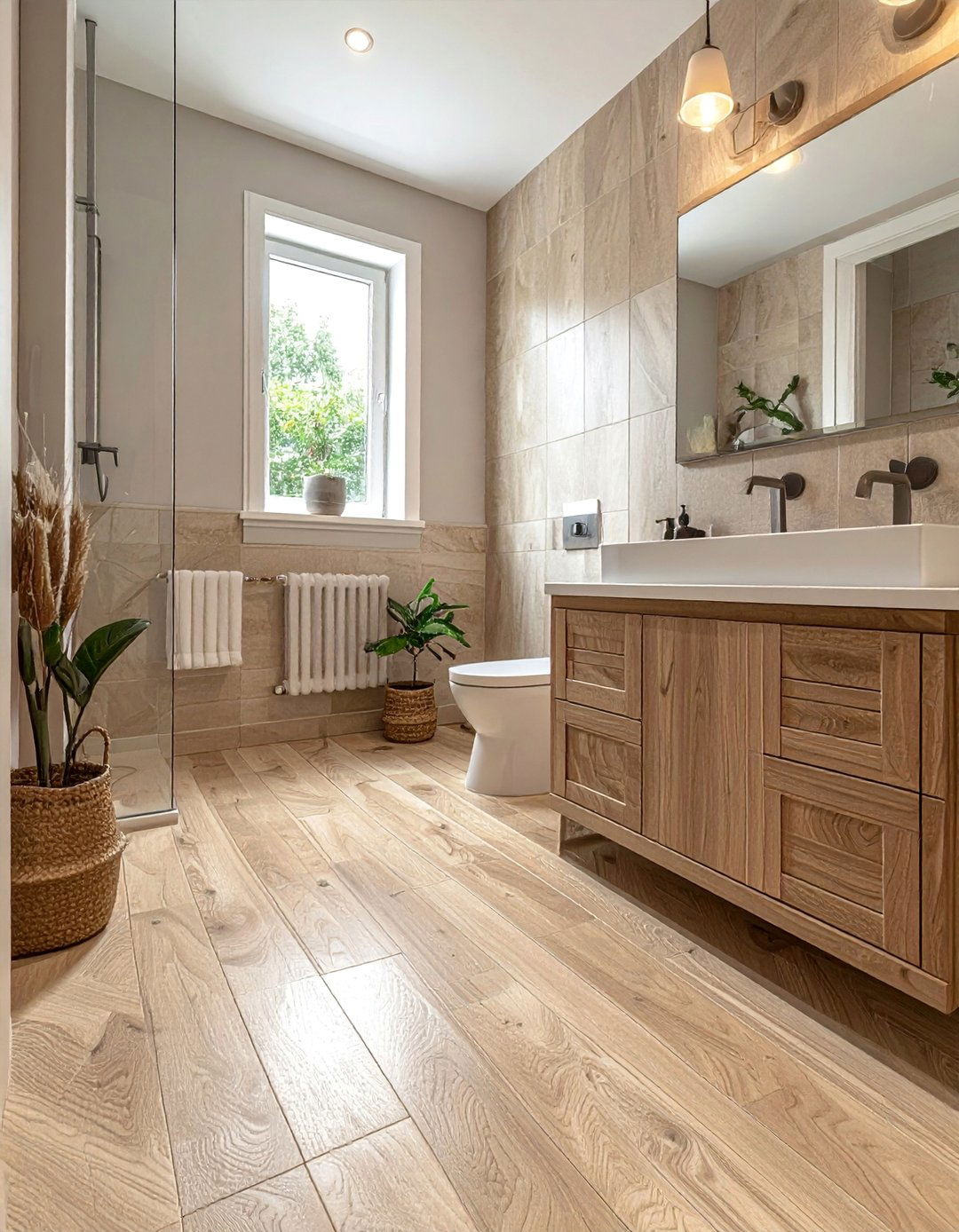
Wood-look porcelain tile offers the perfect solution for bringing the warmth and texture of natural wood into a transitional bathroom without the worry of water damage. This durable material beautifully mimics the grain and color variations of real hardwood, adding an organic, grounding element to the space. It serves as an excellent bridge between classic and contemporary styles, pairing as well with a sleek, modern vanity as it does with more traditional fixtures. Arranged in a classic plank layout or a more modern herringbone pattern, these tiles provide a durable, low-maintenance flooring option that enhances the room’s overall warmth and sophisticated comfort.
11. Transitional Bathroom with Recessed Panel Cabinetry
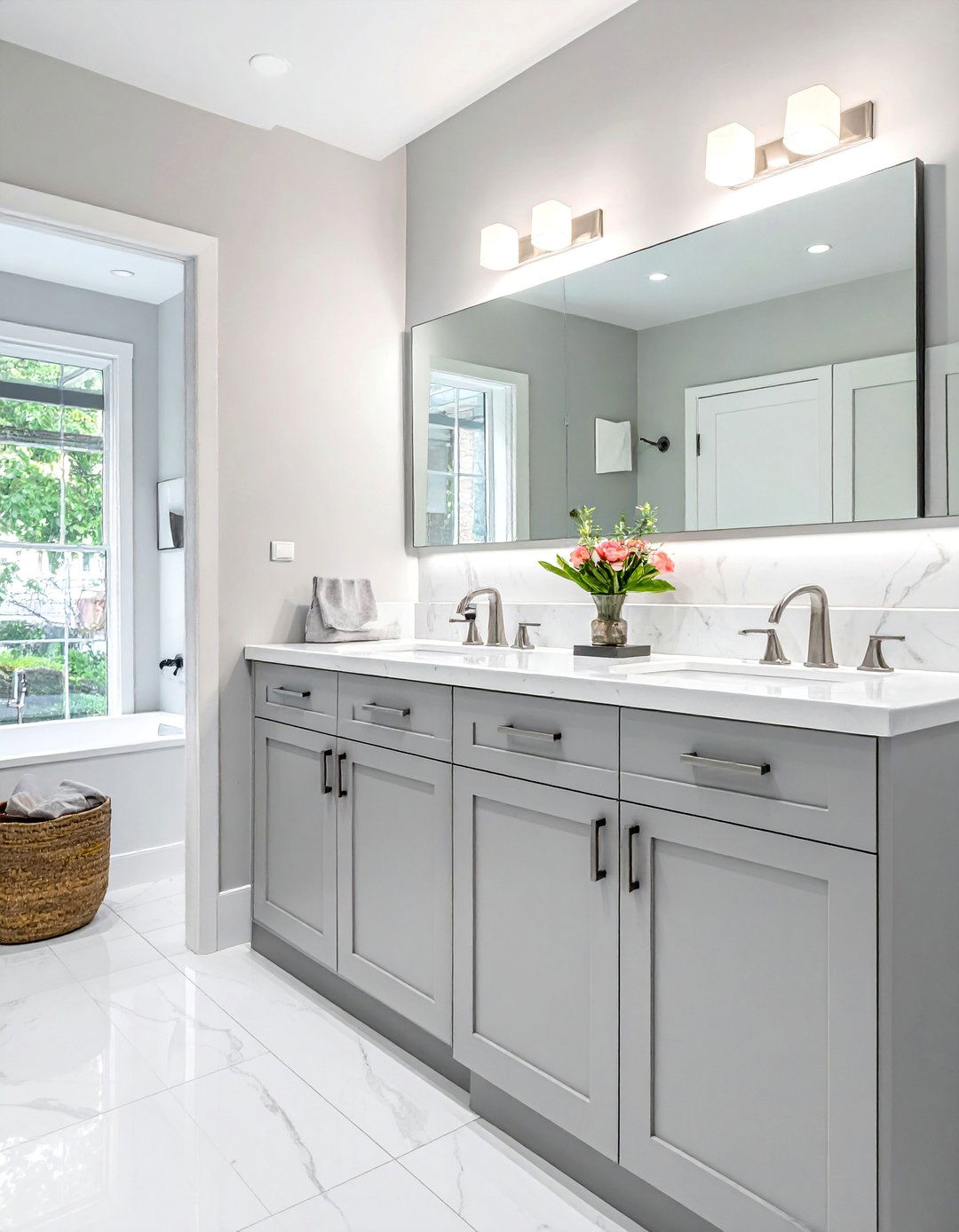
Recessed panel cabinetry, particularly the Shaker style, is a fundamental element of transitional bathroom design. Its clean lines and simple, unadorned profile provide a perfect middle ground between ornate traditional cabinets and stark, flat-panel modern ones. This style emphasizes craftsmanship and quality without unnecessary embellishments, creating a look that is both timeless and fresh. When painted in a versatile neutral color like white, gray, or a deep blue, recessed panel cabinets serve as a sophisticated and functional anchor for the room. Paired with simple, elegant hardware, they contribute to the bathroom's calm, uncluttered, and balanced aesthetic, offering ample storage with enduring appeal.
12. Transitional Bathroom with Quartz Countertops
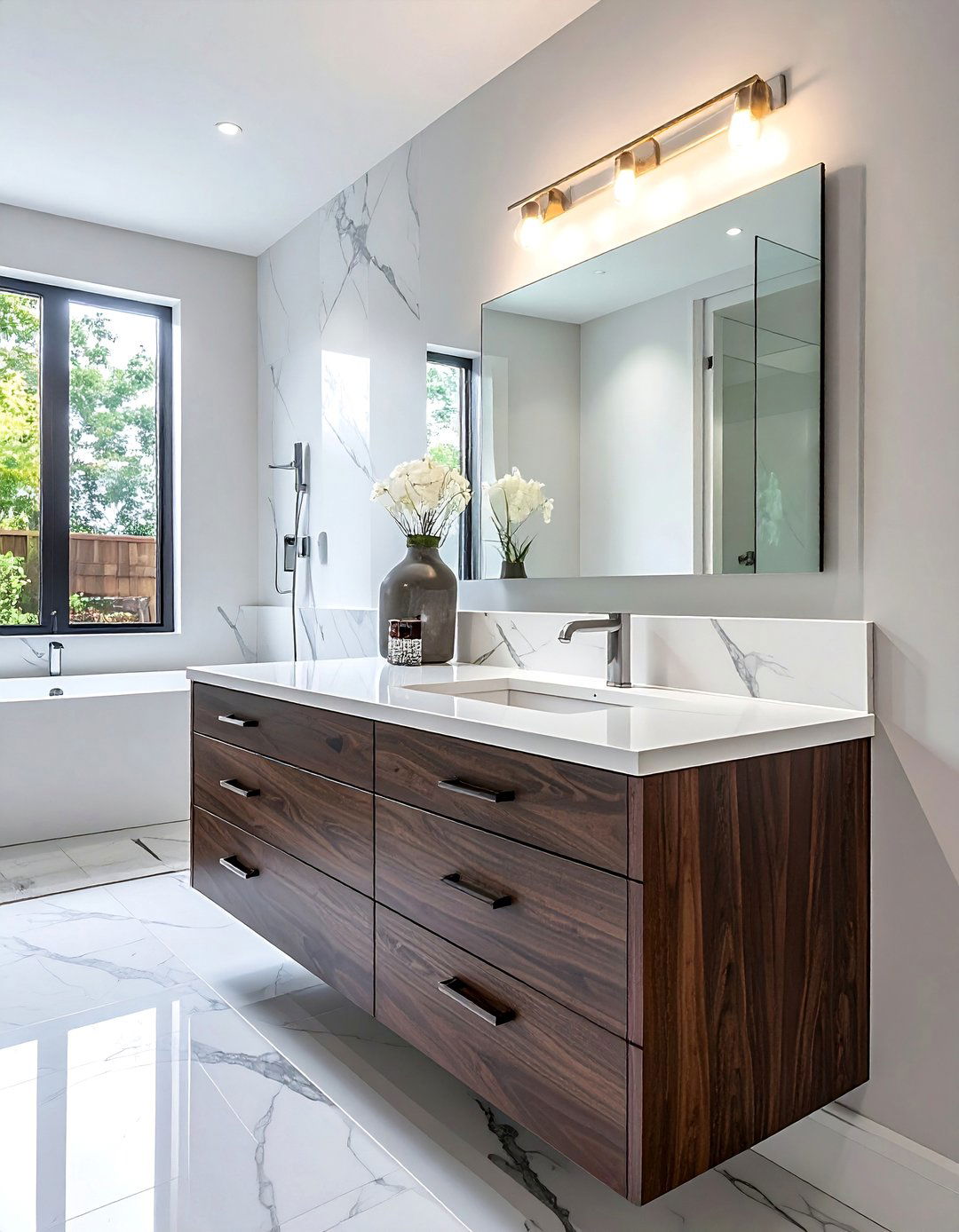
Quartz countertops are an excellent choice for a transitional bathroom, offering the ideal blend of classic beauty and modern performance. Engineered to mimic the look of natural stones like marble or granite, quartz provides a consistent, non-porous surface that is highly resistant to staining, scratching, and bacteria. This durability makes it a practical option for a high-traffic area. Slabs with subtle, soft veining can evoke the timeless elegance of Carrara marble while providing a much more low-maintenance solution. A clean, polished quartz surface pairs flawlessly with both traditional Shaker vanities and sleek, contemporary fixtures, reinforcing the balanced and sophisticated transitional aesthetic.
13. Transitional Bathroom with Trough Sinks
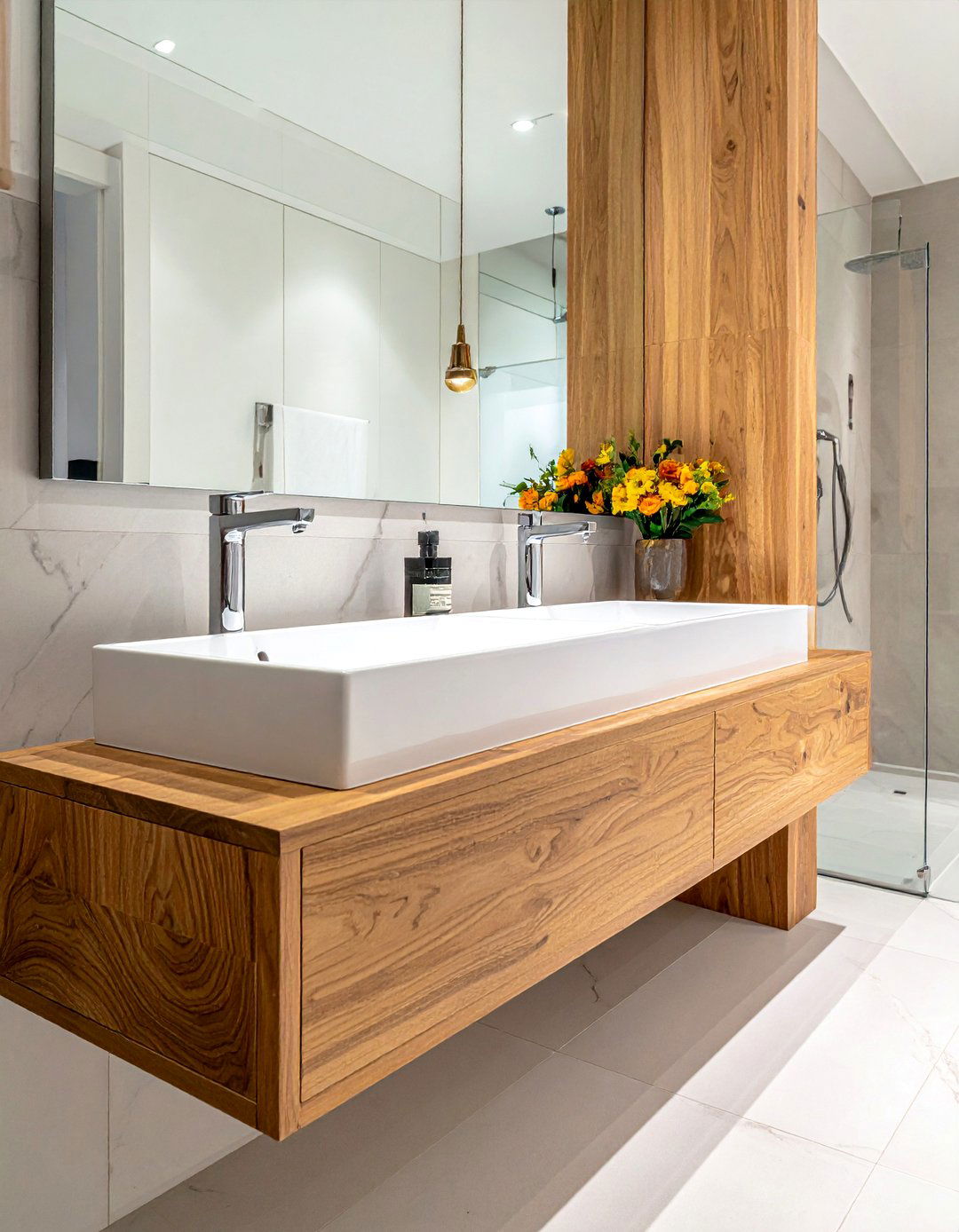
A trough sink introduces a unique blend of vintage utility and modern form, making it a distinctive feature in a transitional bathroom. Originally found in farmhouses and laundry rooms, its elongated basin offers a clean, linear aesthetic that works well with contemporary design, while its historical roots nod to a more traditional era. A trough sink is also highly functional, especially in shared or family bathrooms, providing ample space for multiple users. Whether wall-mounted to create a floating effect or set atop a custom vanity, this style of sink makes a strong statement, combining practicality with a cool, understated design that perfectly captures the transitional spirit.
14. Transitional Bathroom with Statement Lighting
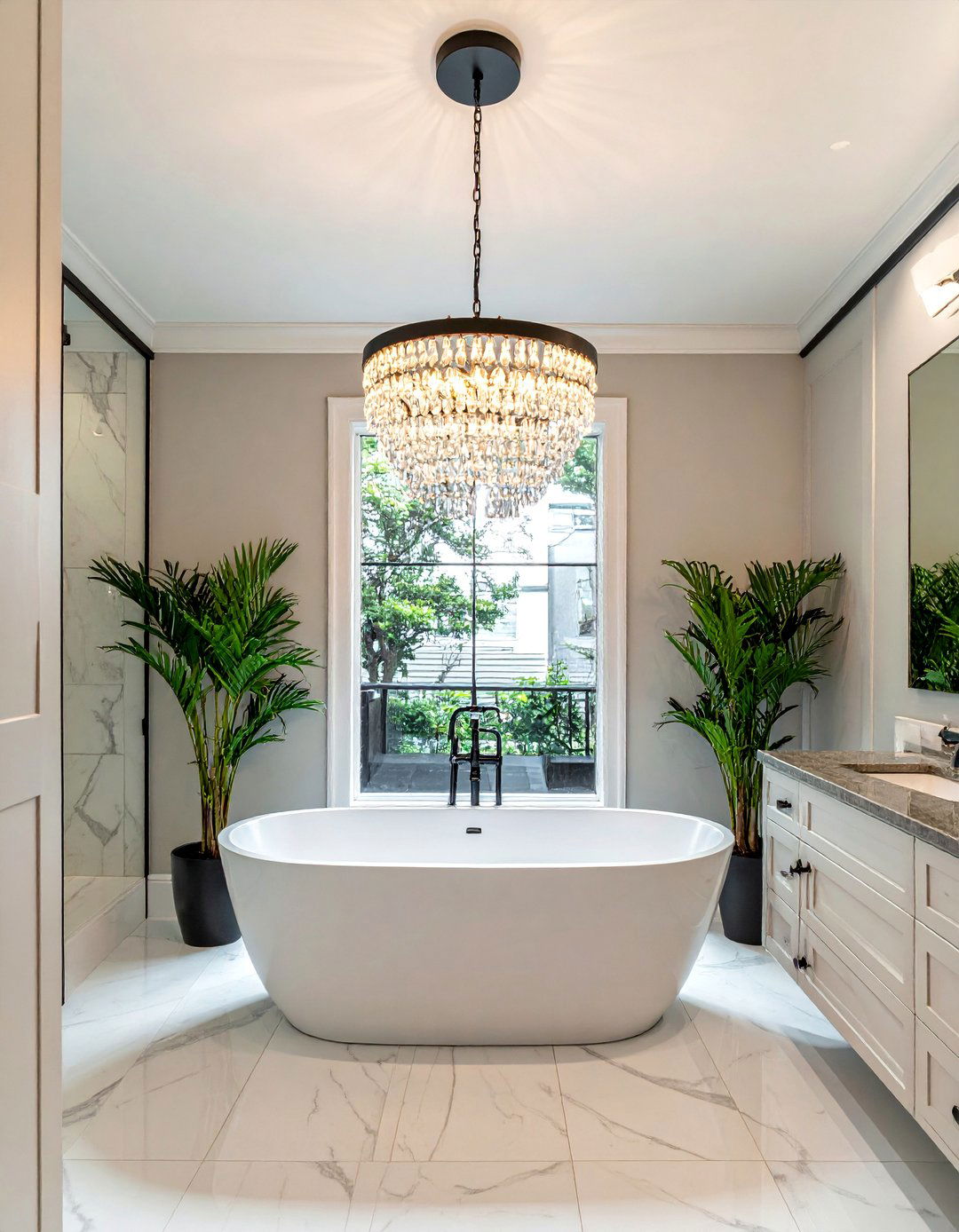
Statement lighting in a transitional bathroom acts as functional jewelry, elevating the design from simple to sophisticated. A well-chosen chandelier, pendant, or pair of sconces can become a stunning focal point. Look for fixtures that blend classic shapes with modern materials. For example, a traditional chandelier form crafted from sleek, contemporary metals or a classic lantern-style sconce with clean lines and minimal detailing. Placing a dramatic fixture over a freestanding tub or flanking a vanity mirror with elegant sconces not only provides layered illumination but also adds a touch of glamour and personality, perfectly balancing the room’s modern and traditional elements.
15. Transitional Bathroom with Built-In Storage Niches
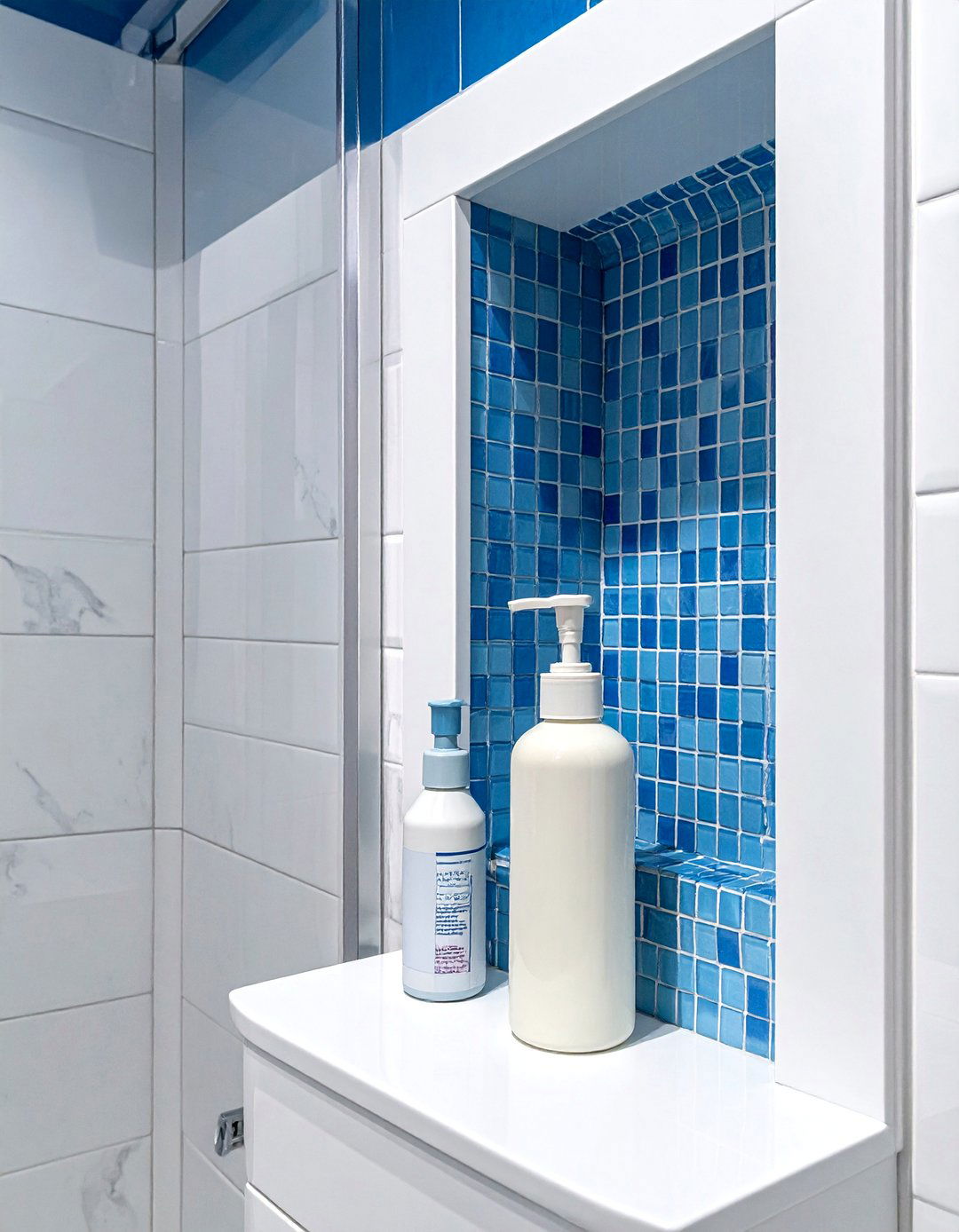
Built-in storage niches, especially within the shower or tub area, are a practical and stylish feature for a transitional bathroom. These recessed shelves provide a designated space for soaps and shampoos, eliminating the need for cluttered caddies and maintaining clean lines. By tiling the niche with the same material as the shower walls, you can create a seamless, integrated look. Alternatively, using a contrasting mosaic or patterned tile inside the niche can turn it into a subtle yet beautiful accent. This custom detail enhances functionality while contributing to the uncluttered, streamlined aesthetic that defines the best of transitional design.
16. Transitional Bathroom with a Large-Scale Mirror
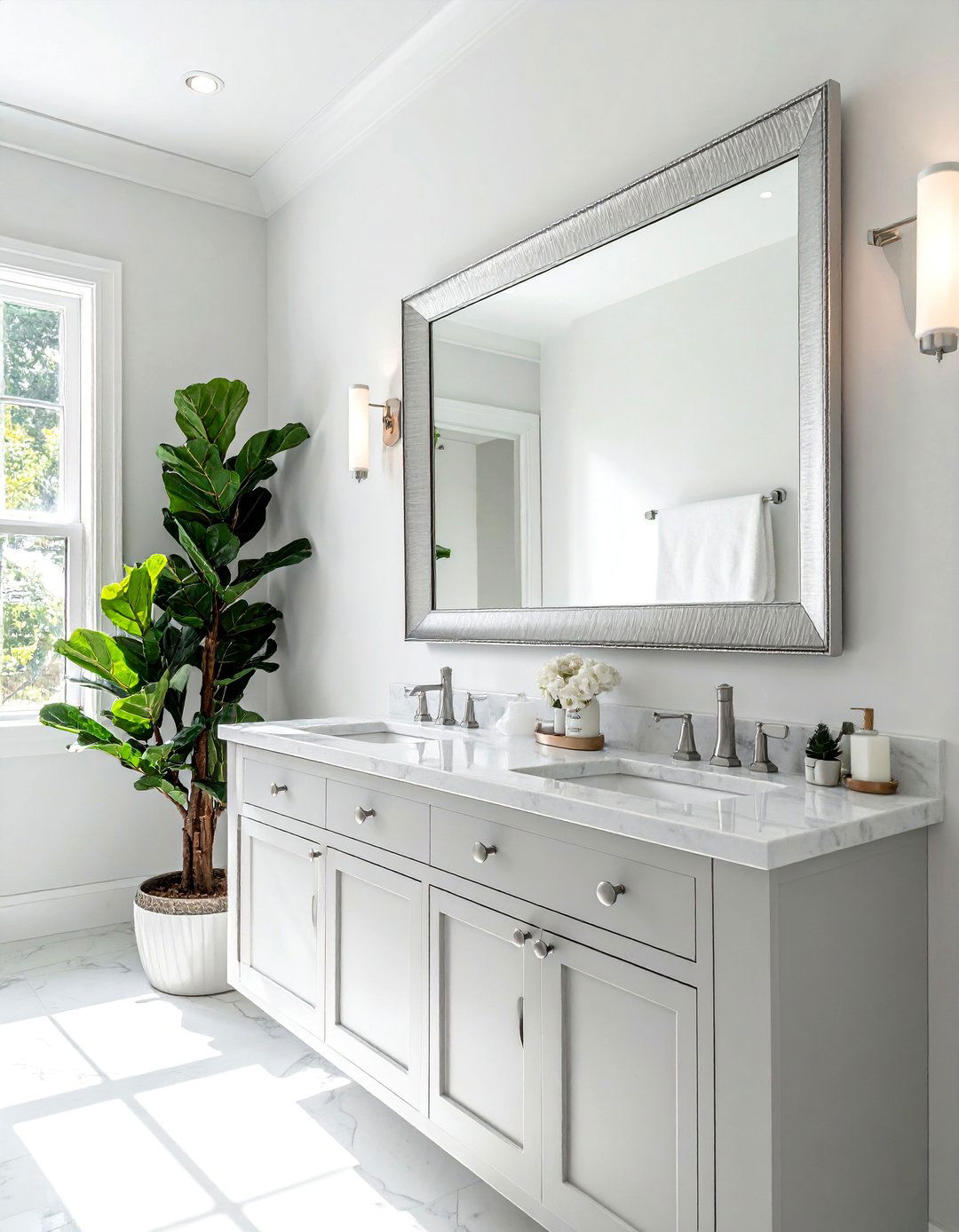
A large-scale mirror is a simple yet powerful tool in a transitional bathroom, enhancing both light and the perception of space. Instead of a standard medicine cabinet, consider a large, single pane of glass or an oversized framed mirror that spans the length of the vanity. A mirror with a simple, clean frame in a metallic or wood finish can add a touch of classic elegance, while a frameless, beveled-edge design leans more contemporary. Regardless of the style, the expansive reflective surface makes the room feel brighter and more open, contributing to the airy and sophisticated atmosphere that is characteristic of transitional interiors.
17. Transitional Bathroom with Wainscoting and Wallpaper
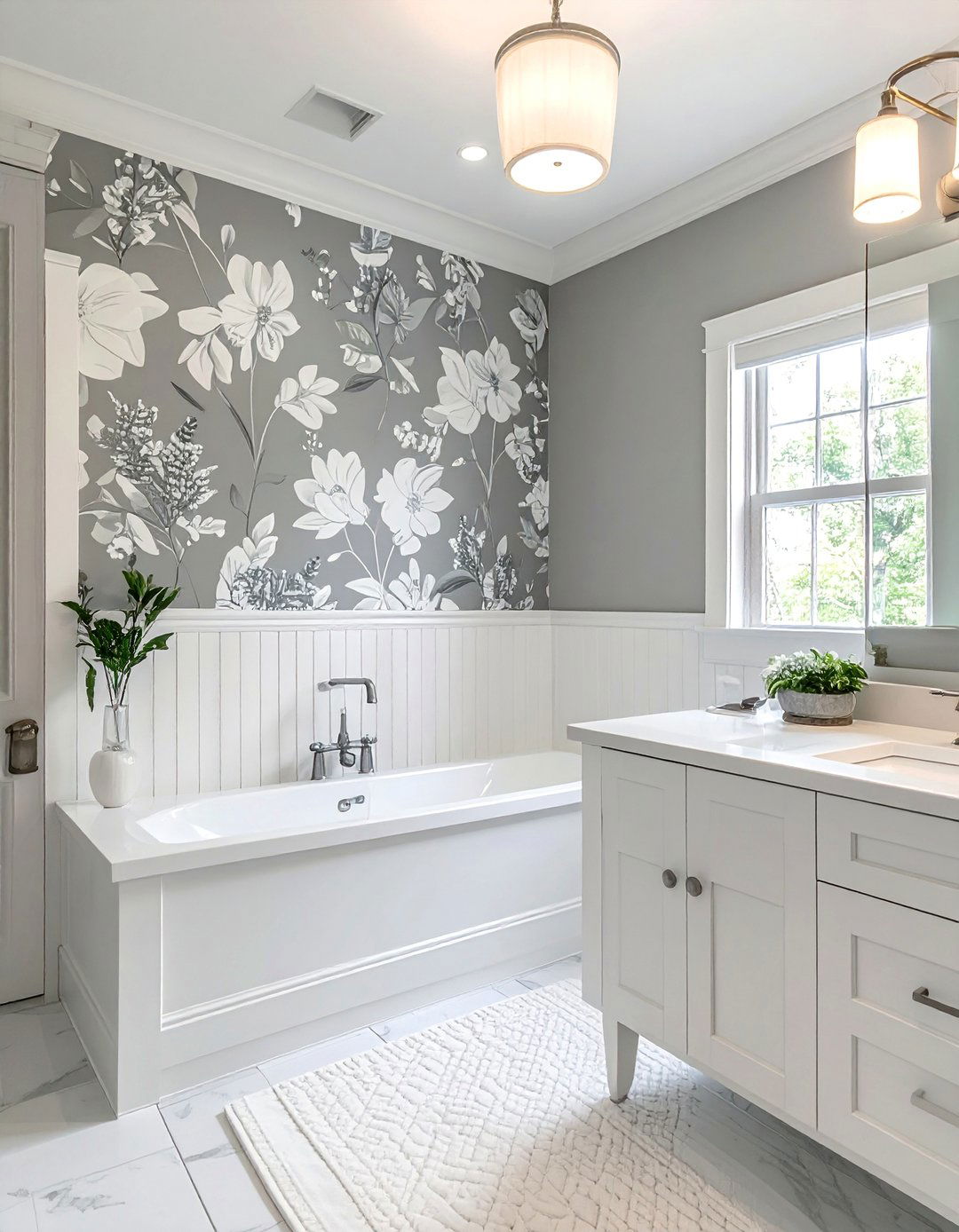
Combining painted wainscoting with wallpaper is a classic technique that adds depth, texture, and personality to a transitional bathroom. The wainscoting, typically beadboard or simple recessed panels painted in a crisp white or soft neutral, grounds the lower half of the room with a traditional architectural element. Above it, a carefully chosen wallpaper introduces pattern and color. For a transitional look, opt for subtle geometrics, organic botanicals, or grasscloth textures rather than overly ornate or fussy prints. This pairing creates a sophisticated, layered design that feels both timeless and custom, perfectly balancing traditional structure with a touch of modern flair.
18. Transitional Bathroom with Under-Vanity Lighting
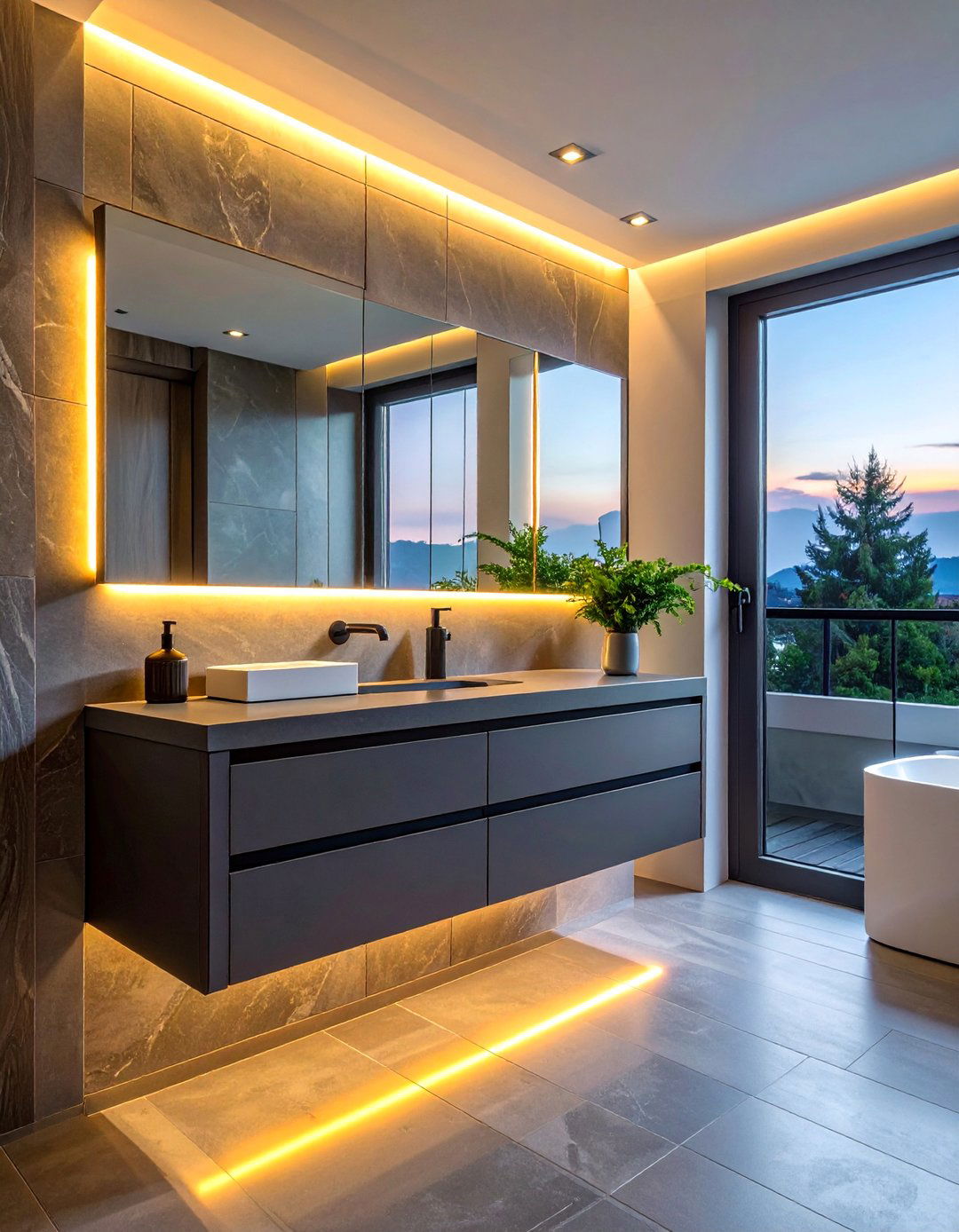
Under-vanity lighting is a modern feature that adds a touch of luxury and high-end functionality to a transitional bathroom. Typically achieved with discreetly placed LED strips, this feature casts a soft, ambient glow across the floor, making the vanity appear to float. It serves as an excellent nightlight, providing gentle, indirect illumination that is easy on the eyes during late-night visits. This contemporary lighting technique complements the clean lines of a modern vanity while adding a layer of warmth and sophistication. It’s a subtle detail that enhances the overall atmosphere, making the space feel more spa-like and thoughtfully designed.
19. Transitional Bathroom with Carrara Marble Tiles
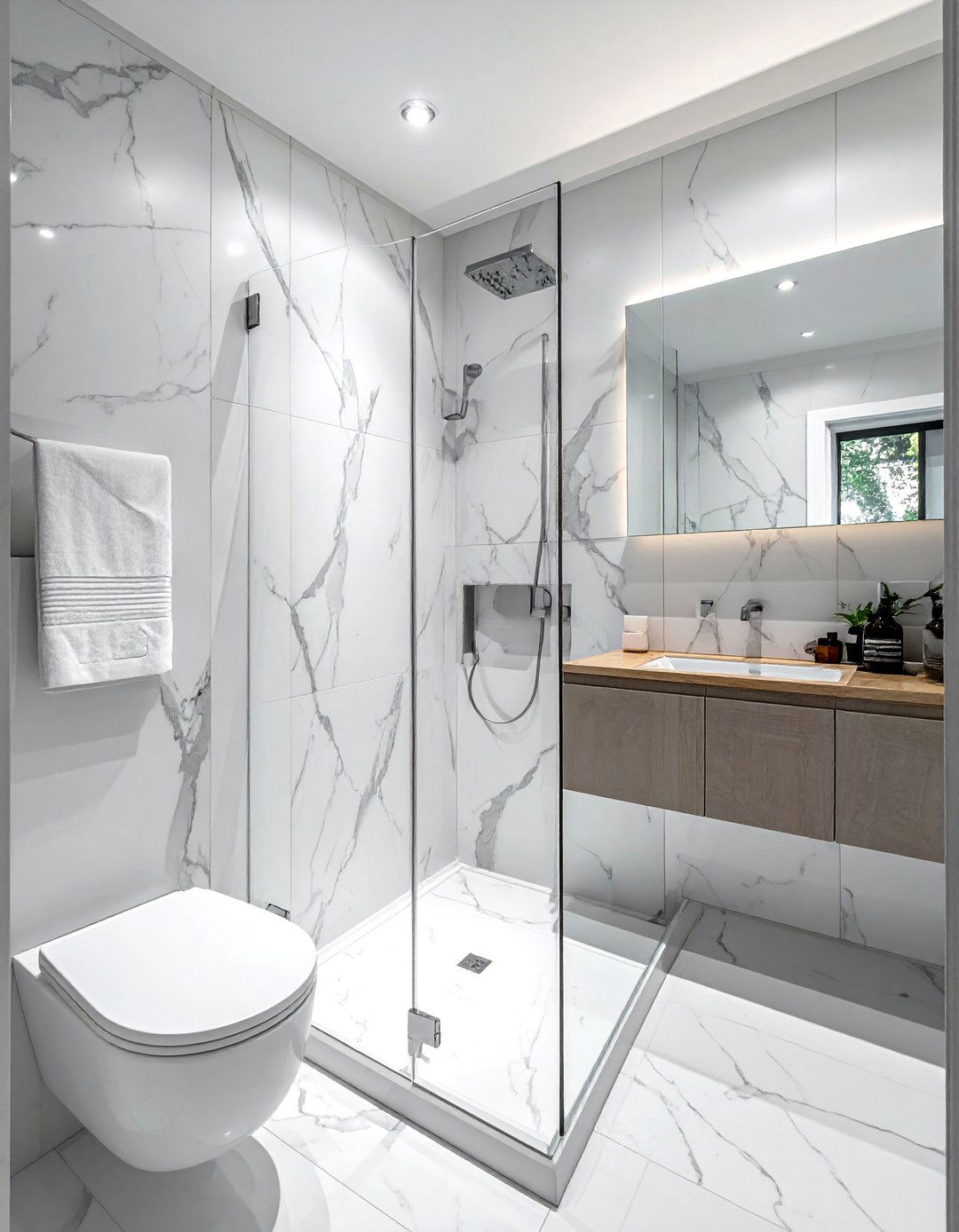
Carrara marble tile is a quintessential material for achieving a timeless and elegant transitional bathroom. Known for its soft white background and subtle, feathery gray veining, it brings a sense of classic luxury without being overly opulent. This versatile stone can be used for flooring, shower walls, or as a countertop, creating a cohesive and sophisticated look. Its natural beauty pairs effortlessly with both modern, clean-lined fixtures and more traditional cabinetry. Whether used in large format tiles for a seamless look or in smaller mosaic patterns like herringbone or basketweave for added texture, Carrara marble provides a bright, refined foundation for any transitional design.
20. Transitional Bathroom with a Walk-In Shower
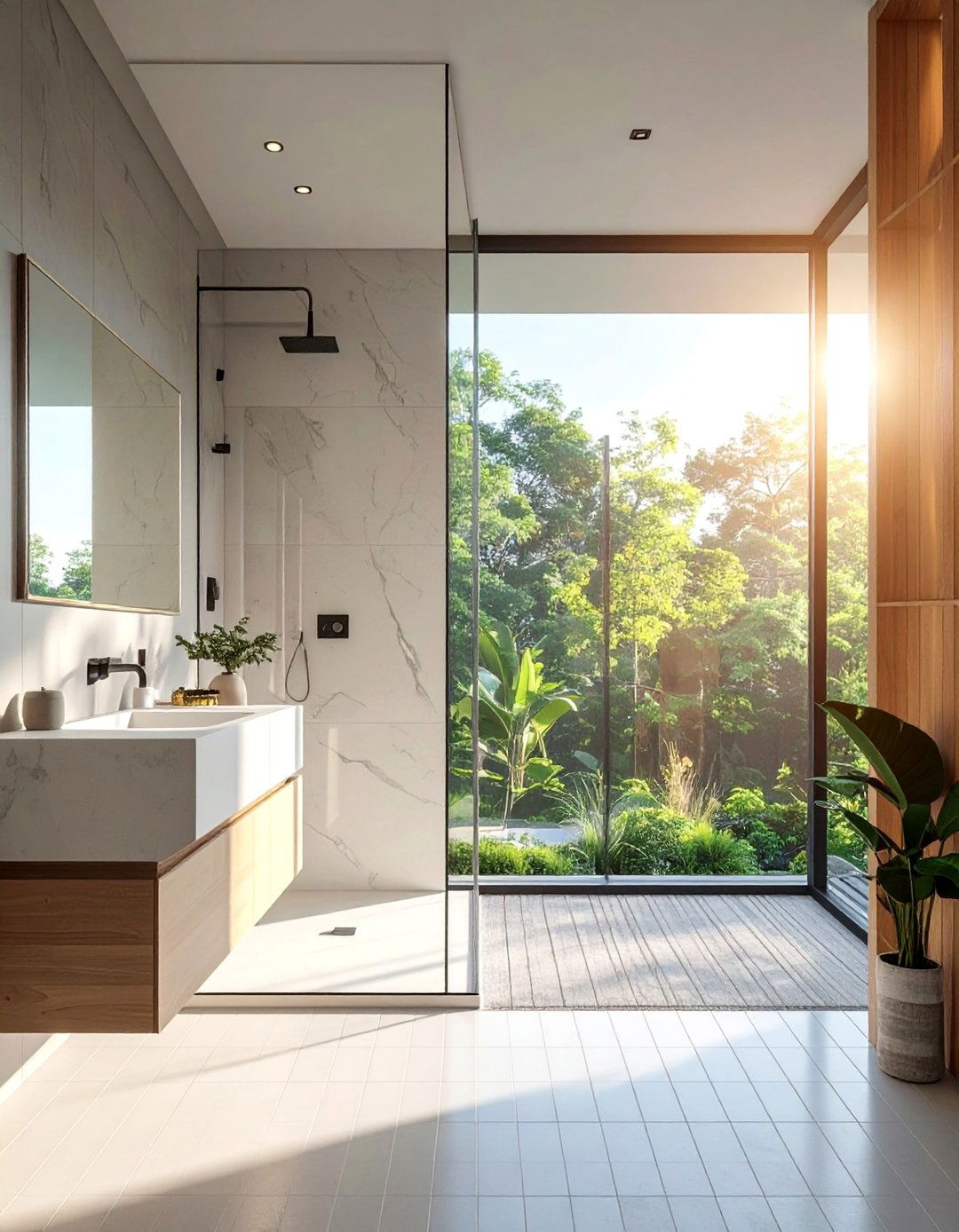
A walk-in shower with a low or non-existent curb is a popular feature in transitional bathrooms, offering a seamless blend of modern accessibility and clean design. This open-concept approach eliminates visual barriers, making the entire bathroom feel more spacious and integrated. Often enclosed by a simple panel of frameless glass, the walk-in shower allows the tilework to be the star. The lack of a traditional door or bulky frame contributes to the uncluttered aesthetic central to transitional style. It’s a practical, sophisticated choice that enhances functionality and provides a spa-like experience, marrying contemporary convenience with timeless appeal.
21. Transitional Bathroom with Matte Black Hardware
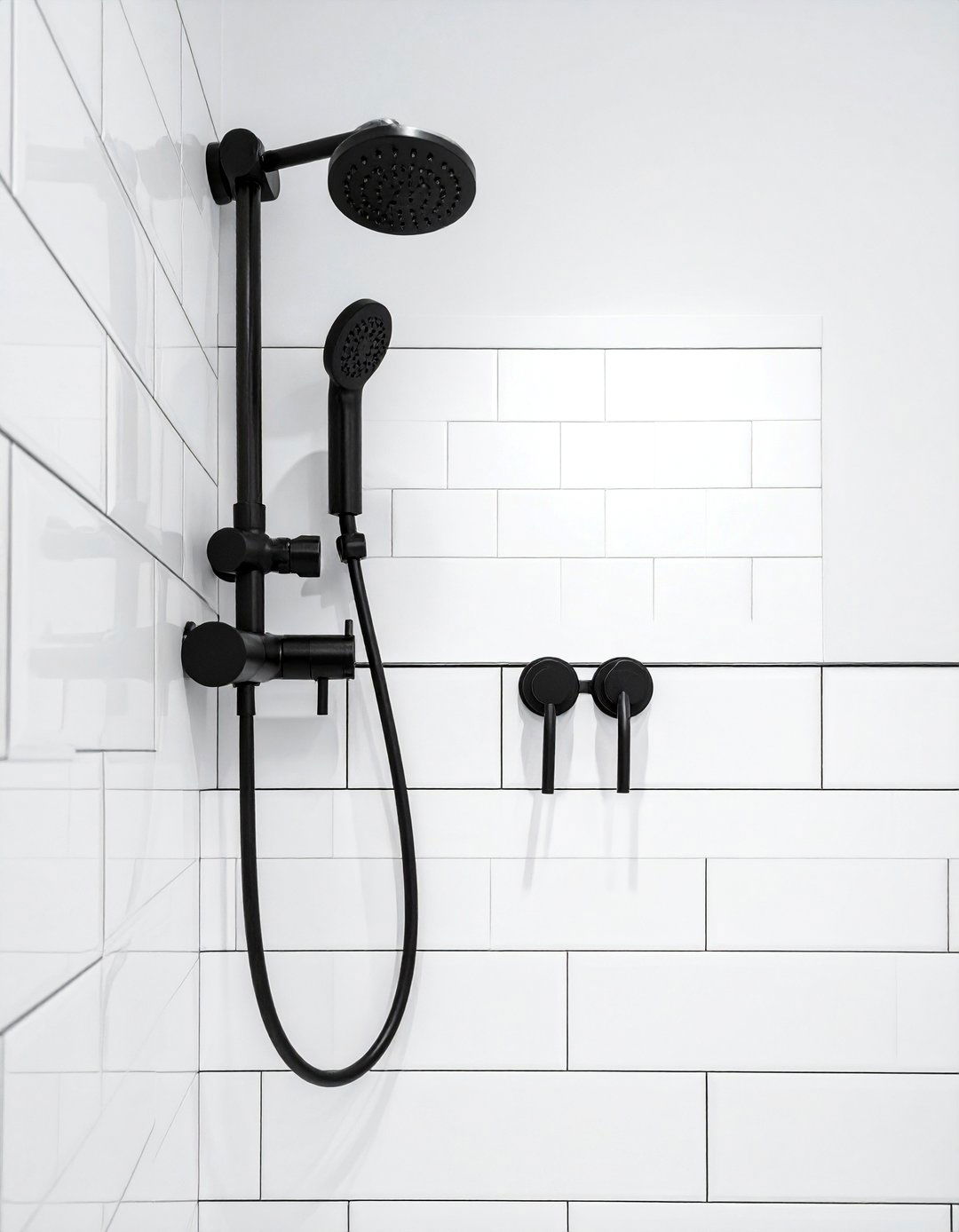
Matte black hardware and fixtures introduce a bold, contemporary edge to a transitional bathroom, creating a striking contrast against a neutral backdrop. This modern finish on faucets, cabinet pulls, shower frames, and light fixtures adds a graphic, architectural element to the space. It pairs exceptionally well with classic materials like white subway tile or Carrara marble, highlighting their timeless beauty while injecting a dose of modern attitude. Unlike shinier finishes, matte black is excellent at hiding fingerprints and water spots, making it a practical choice. This high-contrast element provides a sophisticated and confident touch that helps to balance the design.
22. Transitional Bathroom with Natural Stone Accents
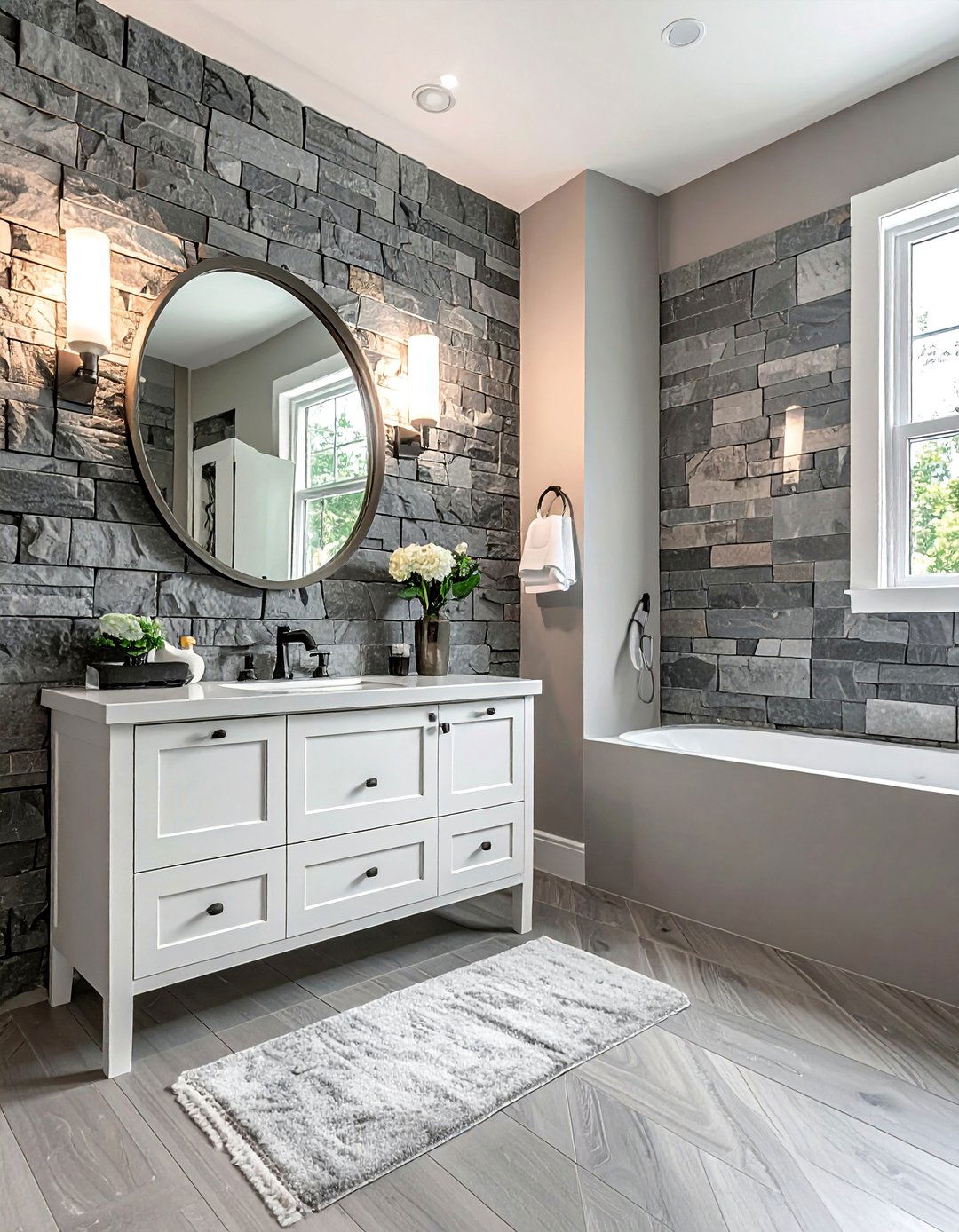
Incorporating natural stone accents beyond the countertop is a fantastic way to add texture and an organic feel to a transitional bathroom. A feature wall of stacked stone behind the vanity or in the shower can create a dramatic and earthy focal point. Smaller touches, like a pebble tile shower floor or a stone mosaic accent strip, can also introduce tactile interest without overwhelming the space. These materials connect the room to the natural world, providing a sense of calm and permanence. The unique patterns and colors found in stones like slate, travertine, or limestone add a layer of rustic elegance that beautifully complements the clean lines of modern elements.
23. Transitional Bathroom with a Double Vanity
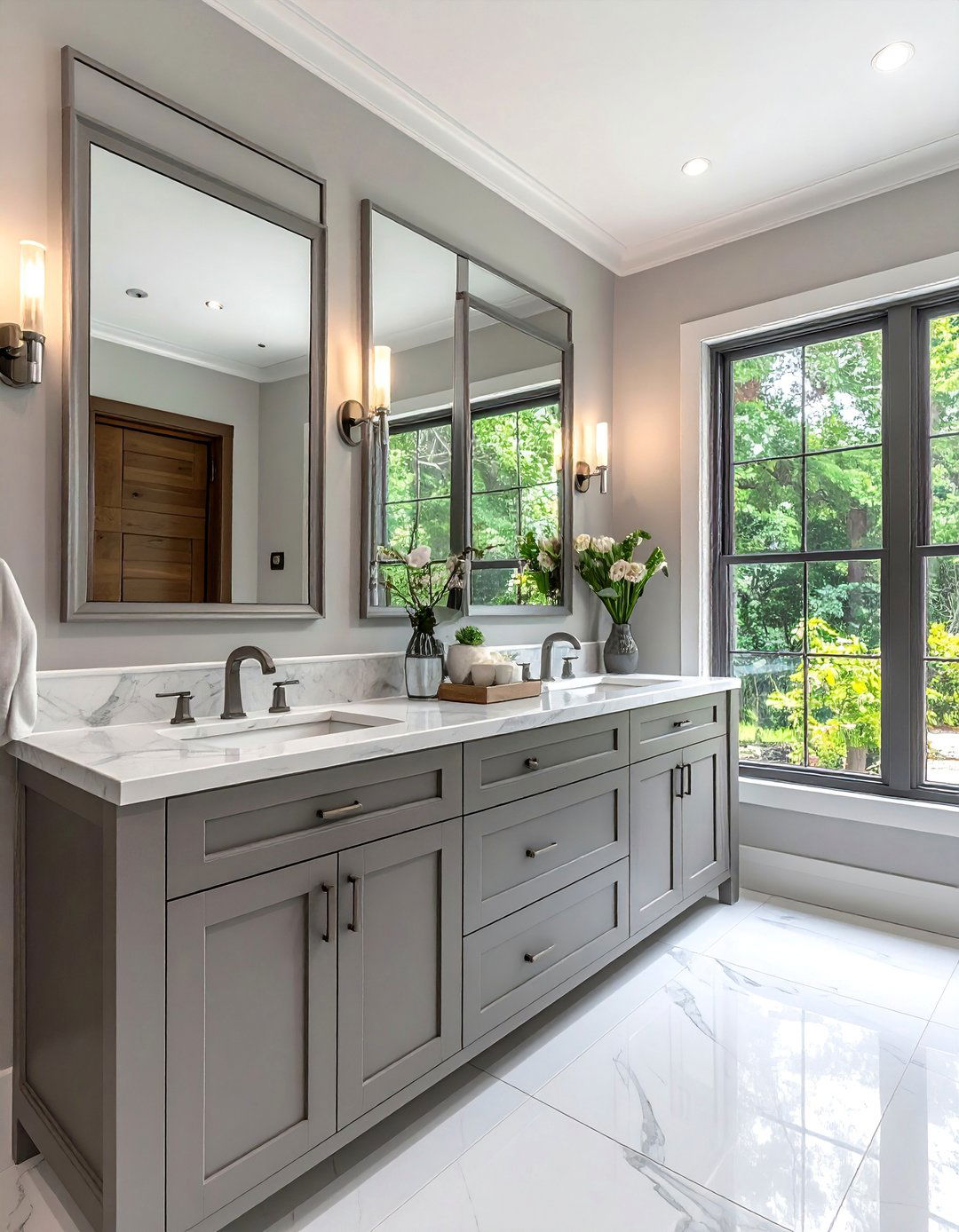
A double vanity is a highly functional and aesthetically balanced feature in a primary transitional bathroom. Providing separate sinks and personal space for two people, it enhances convenience and reduces morning congestion. In transitional design, a double vanity often consists of two individual sink cabinets joined by a single countertop or a long, single unit with two sinks. This symmetrical arrangement creates a sense of order and calm. Shaker-style cabinetry painted in a neutral hue and topped with quartz or marble reinforces the classic-meets-modern aesthetic. Paired with twin mirrors and elegant sconces, the double vanity becomes a strong, harmonious focal point.
24. Transitional Bathroom with Heated Floors
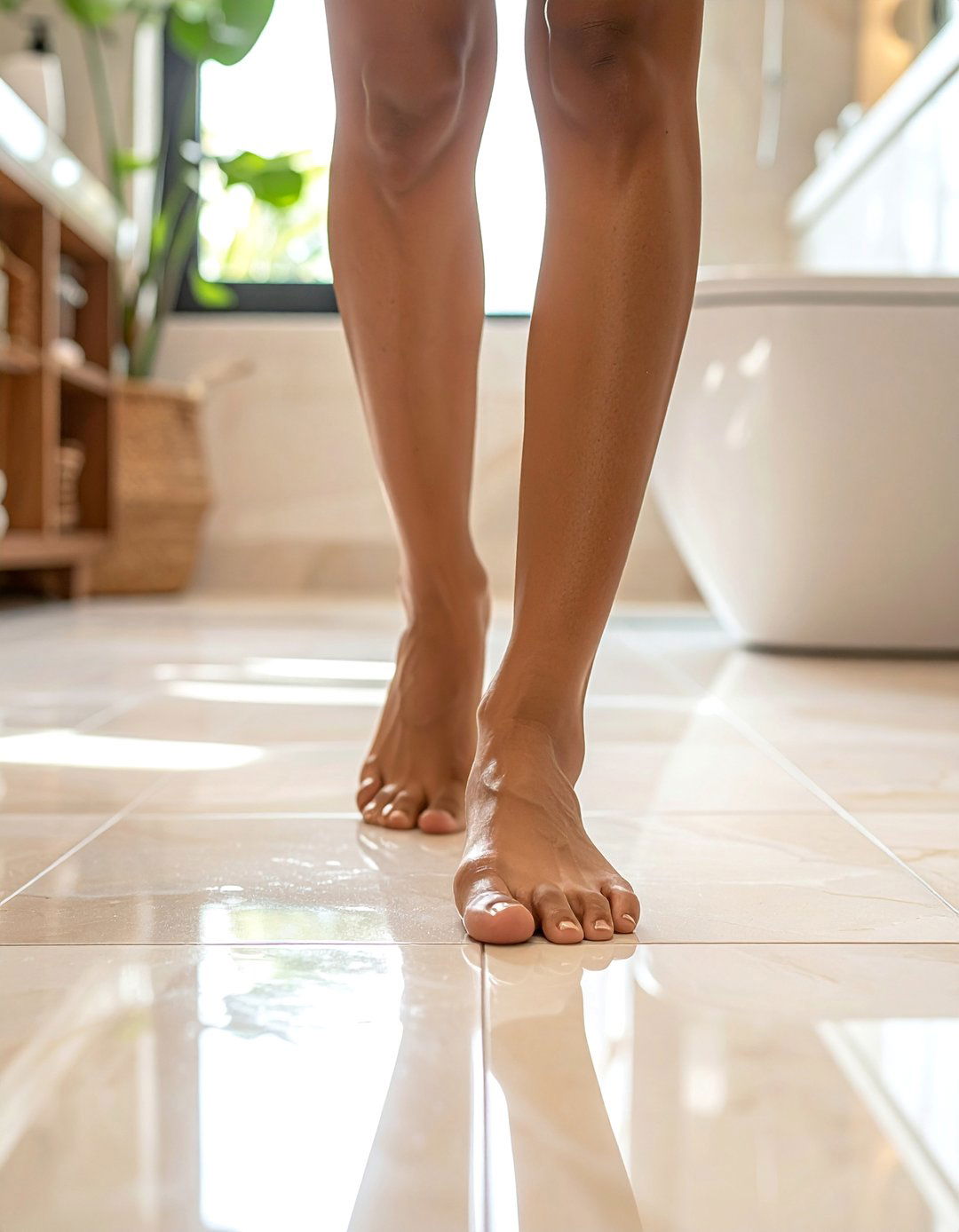
Heated floors are a luxurious, modern amenity that seamlessly integrates into the comfort-focused ethos of a transitional bathroom. This invisible feature, installed beneath the tile, provides radiant heat that warms the entire space from the ground up, making cold winter mornings much more pleasant. Beyond the obvious comfort, heated floors can be an energy-efficient way to heat the room. This practical luxury adds a spa-like quality to the bathroom without disrupting the visual design. It’s a contemporary indulgence that enhances the user's experience, perfectly aligning with the transitional goal of creating a space that is both stylish and supremely comfortable.
25. Transitional Bathroom with Elegant Sconce Lighting
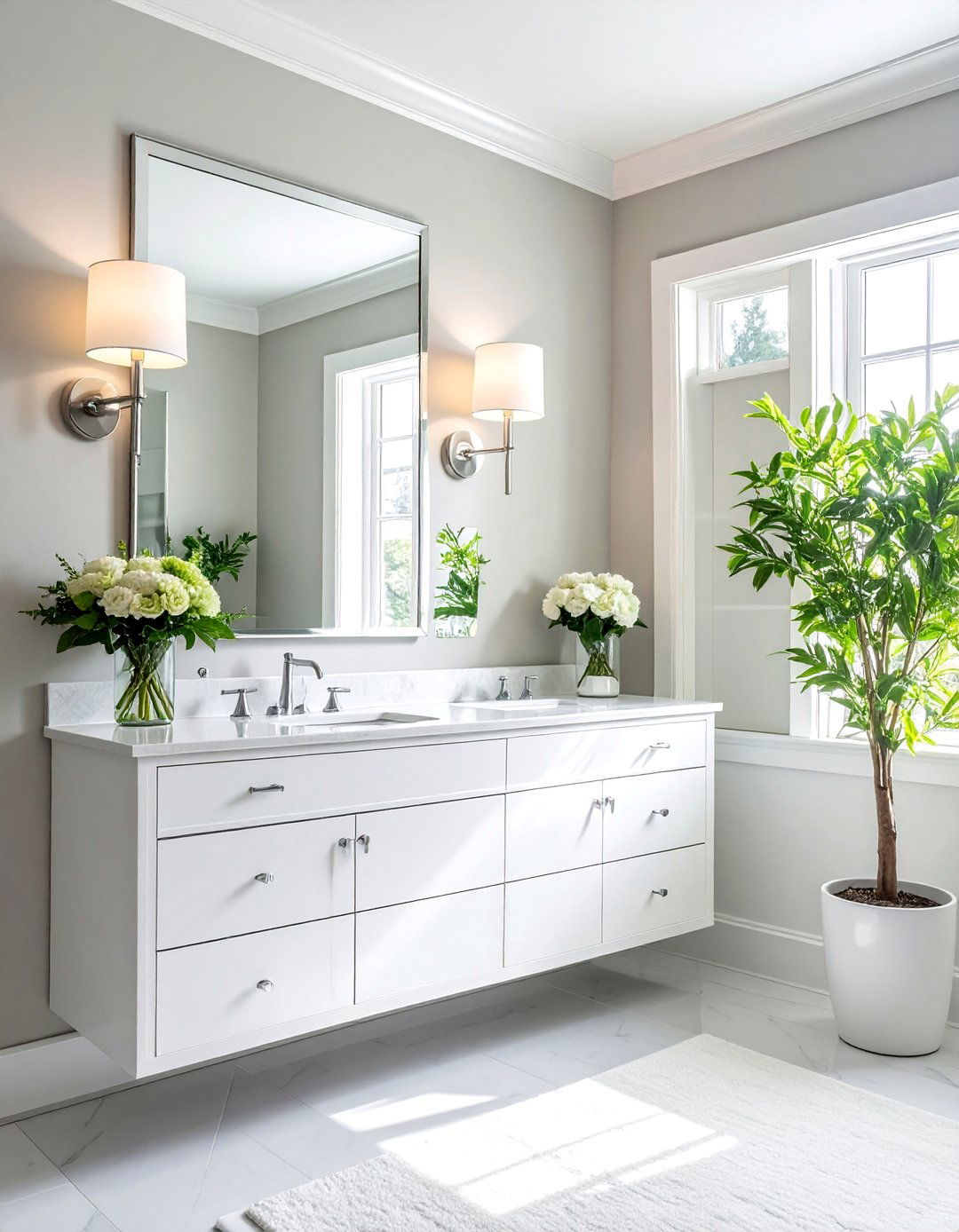
Elegant sconce lighting, particularly when flanking a vanity mirror, is a key element in elevating a transitional bathroom design. Unlike harsh overhead lighting, sconces provide flattering, cross-illumination that minimizes shadows, making tasks like shaving or applying makeup easier. For a transitional look, choose fixtures that blend classic forms with modern simplicity. Think clean lines, simple glass shades, and refined metallic finishes like polished nickel or soft brass. This style of lighting adds a layer of sophistication and architectural detail, framing the vanity area and contributing to the room's warm, inviting, and well-balanced ambiance.
26. Transitional Bathroom with a Soaking Tub and Shower Combination
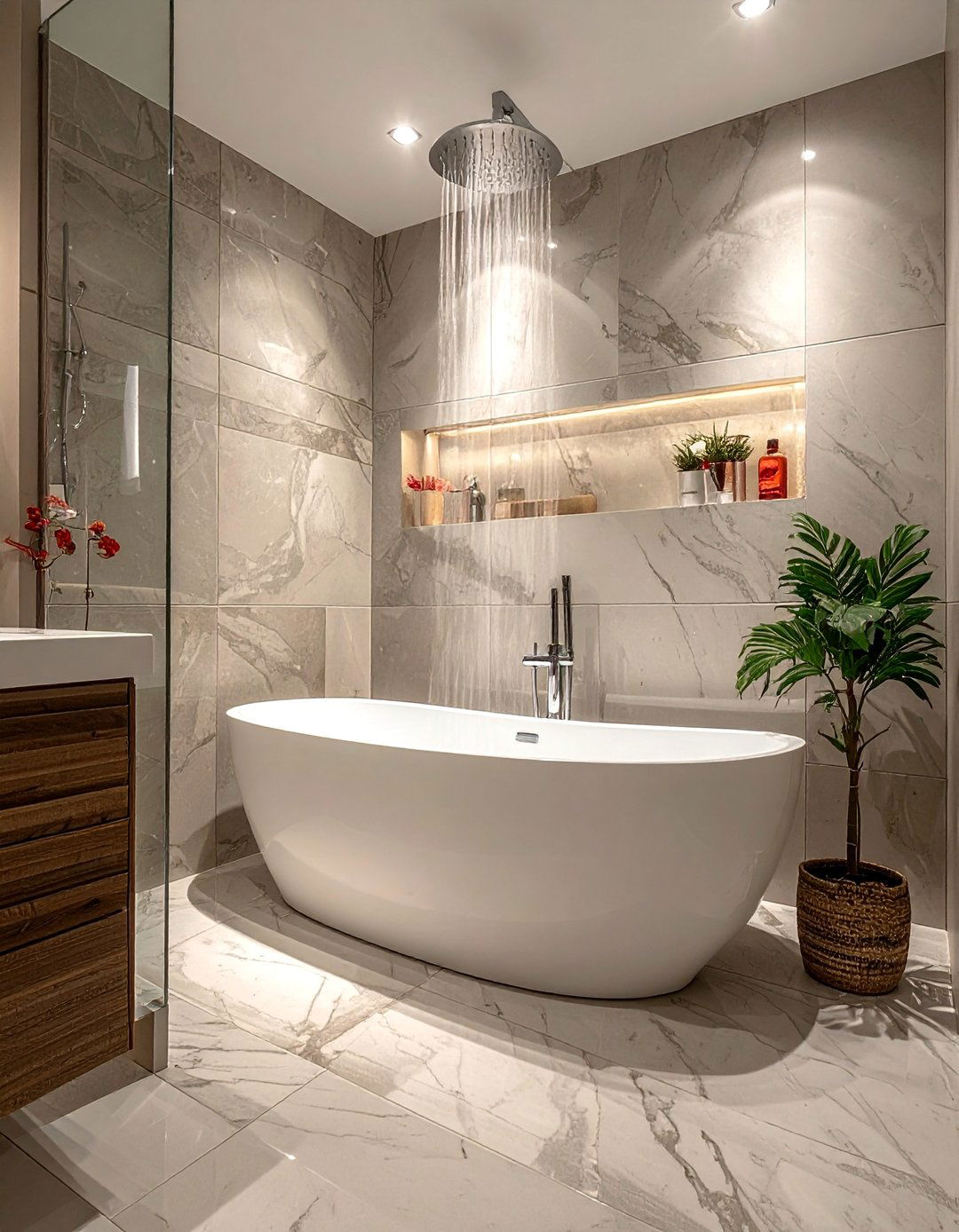
For spaces that can't accommodate both a separate tub and shower, a high-design soaking tub and shower combination is an excellent transitional solution. This isn't your standard builder-grade setup. Instead, it features a deep, comfortable soaking tub paired with a sleek, frameless glass door or panel to create an open feel. The surrounding walls are often tiled to the ceiling in a classic material like subway or marble tile. Upgrading the fixtures to a high-quality, stylish showerhead and tub filler further elevates the look. This practical approach ensures functionality without sacrificing the luxurious, spa-like feel central to transitional design.
27. Transitional Bathroom with a Furniture-Style Vanity
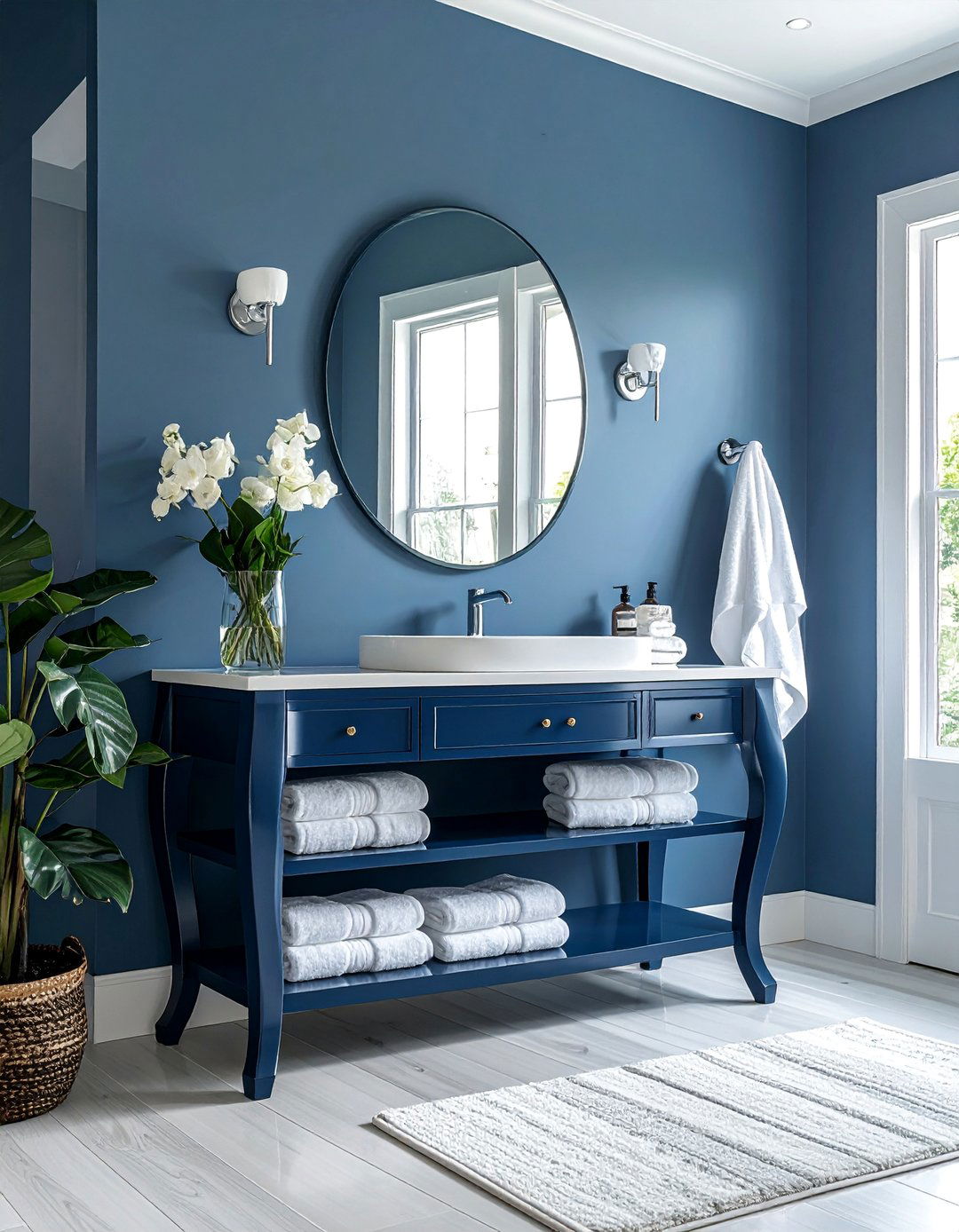
A furniture-style vanity adds a touch of custom, classic elegance to a transitional bathroom, making it feel less like a standard utility room and more like a thoughtfully furnished space. These vanities often feature details like turned legs, drawers with decorative fronts, or an open lower shelf for storing towels and baskets. They stand off the floor, which creates a lighter, less bulky appearance compared to a traditional toe-kick cabinet. Crafted from wood and painted in a sophisticated neutral or a bold accent color, a furniture-style vanity serves as a beautiful centerpiece that perfectly marries traditional craftsmanship with a modern, freestanding aesthetic.
28. Transitional Bathroom with Herringbone Tile Pattern
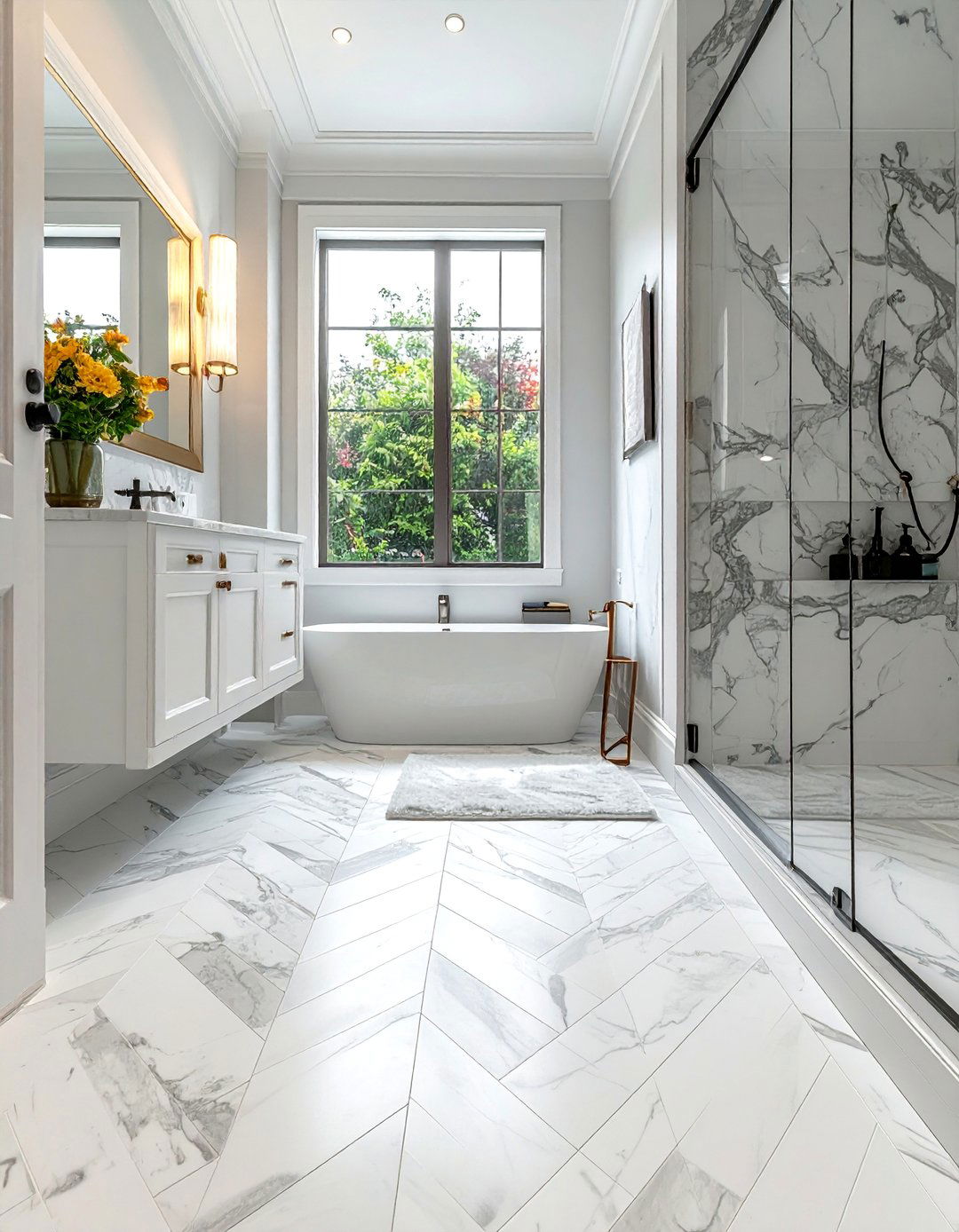
Using a herringbone pattern for tile installation is a fantastic way to add dynamic visual interest to a transitional bathroom while still using classic materials. This zigzag layout can be applied to flooring or a shower accent wall using materials like wood-look porcelain, marble, or classic subway tiles. The pattern itself is timeless, but its clean, geometric lines feel fresh and contemporary. It creates a sense of movement and sophistication, elevating a simple material into a statement feature. Whether used in a large or small scale, the herringbone pattern adds a layer of texture and refined detail that perfectly captures the transitional balance of classic and modern.
29. Transitional Bathroom with Window Treatments
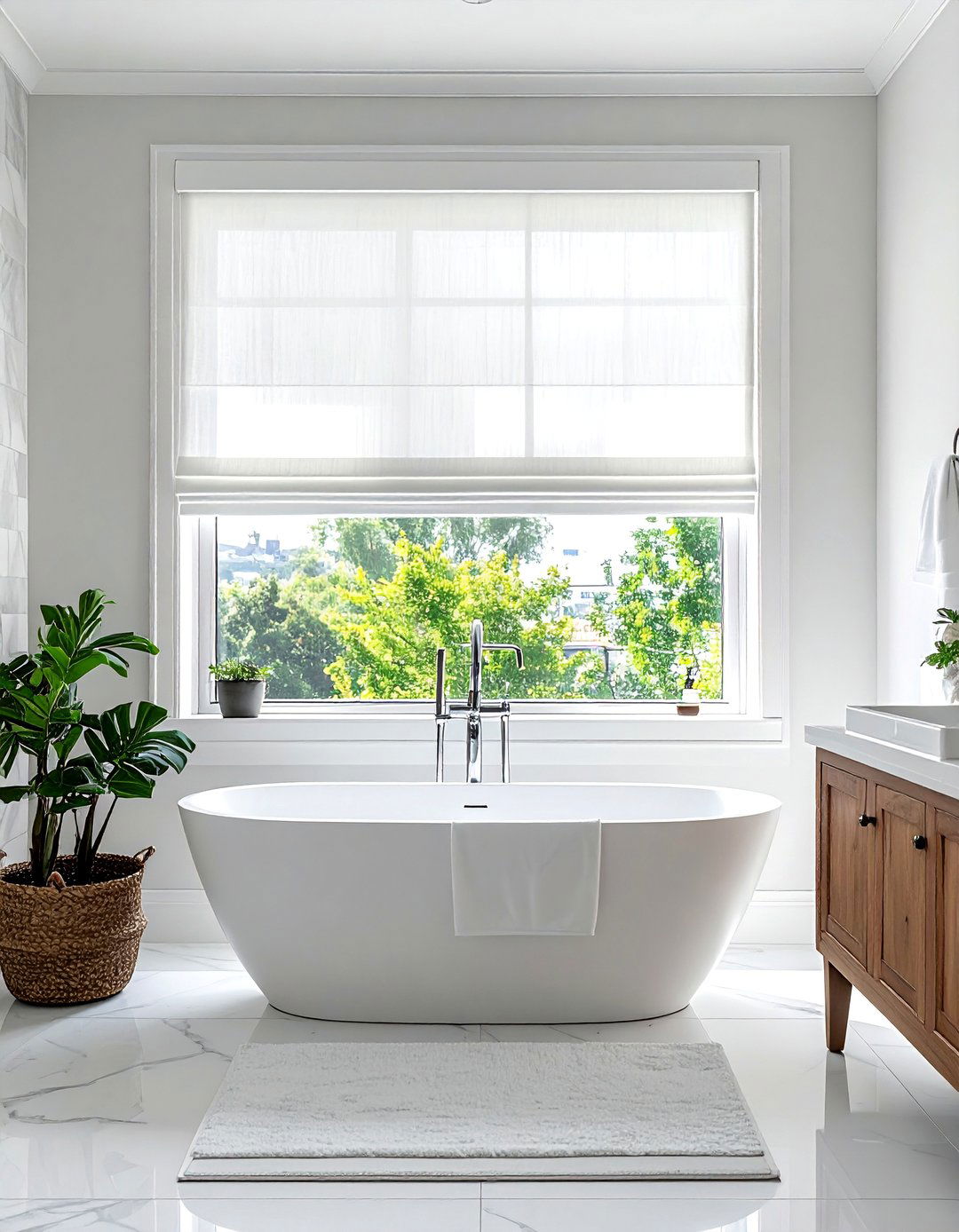
Thoughtful window treatments are crucial for completing the look of a transitional bathroom, adding softness, privacy, and light control. For this style, avoid heavy, ornate draperies. Instead, opt for tailored solutions like Roman shades in a high-quality linen or cotton blend, which provide a clean, structured look when raised and a soft, elegant feel when lowered. Woven wood or bamboo shades can introduce a natural, organic texture that adds warmth to the space. Simple plantation shutters are another excellent choice, offering a timeless architectural element with adjustable louvers for precise light and privacy management.
30. Transitional Bathroom with Polished Chrome Fixtures
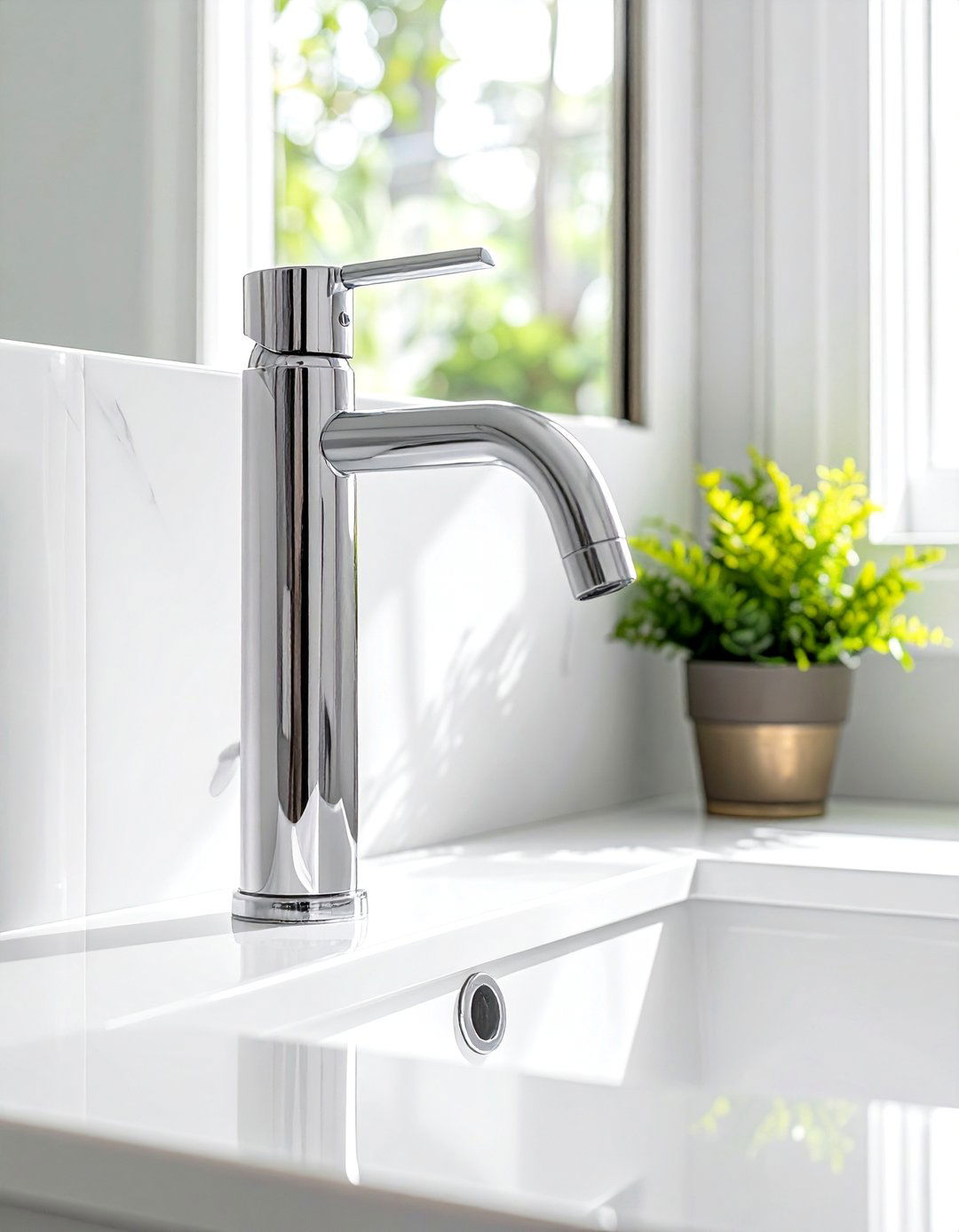
Polished chrome fixtures bring a bright, clean, and distinctly modern touch to a transitional bathroom. This highly reflective finish is known for its durability and ease of cleaning, making it a practical and popular choice. While it leans contemporary, its timeless shine pairs beautifully with classic elements like marble countertops and Shaker-style vanities. The cool, silvery tone of chrome provides a crisp contrast against warmer wood tones or colored cabinetry. For a cohesive look, use it consistently across faucets, showerheads, and towel bars. This versatile finish provides a sleek, polished look that enhances the fresh and uncluttered feel of a transitional space.
Conclusion:
Ultimately, transitional bathrooms offer a beautifully balanced aesthetic that stands the test of time. By skillfully combining the warmth and elegance of traditional design with the clean simplicity of modern style, these spaces become personal sanctuaries. The focus on neutral palettes, high-quality materials like marble and quartz, and a mix of classic and contemporary fixtures results in a look that is both sophisticated and inviting. Whether through a statement freestanding tub or the simple lines of a Shaker vanity, this design approach creates a serene, functional, and enduringly stylish bathroom retreat.

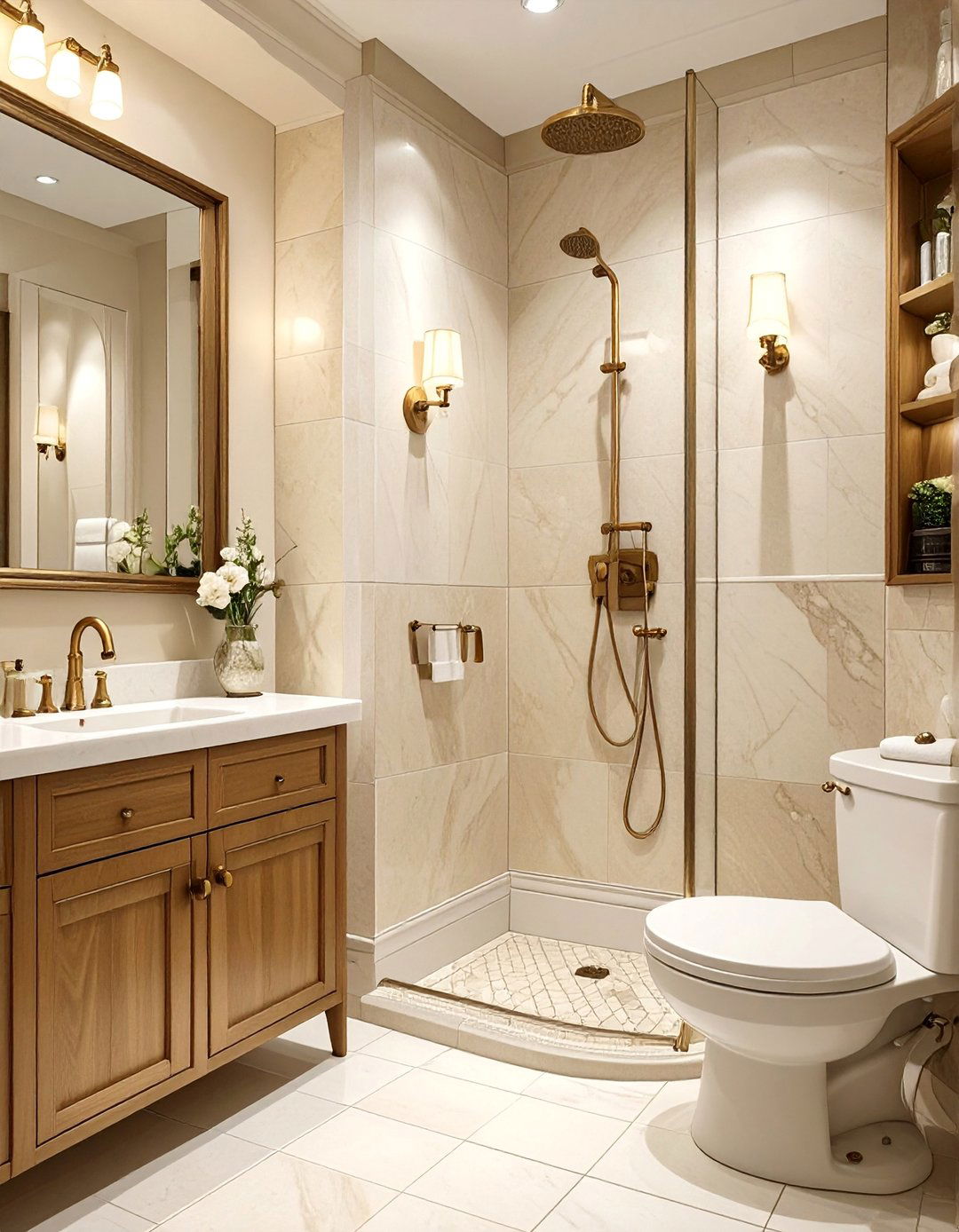
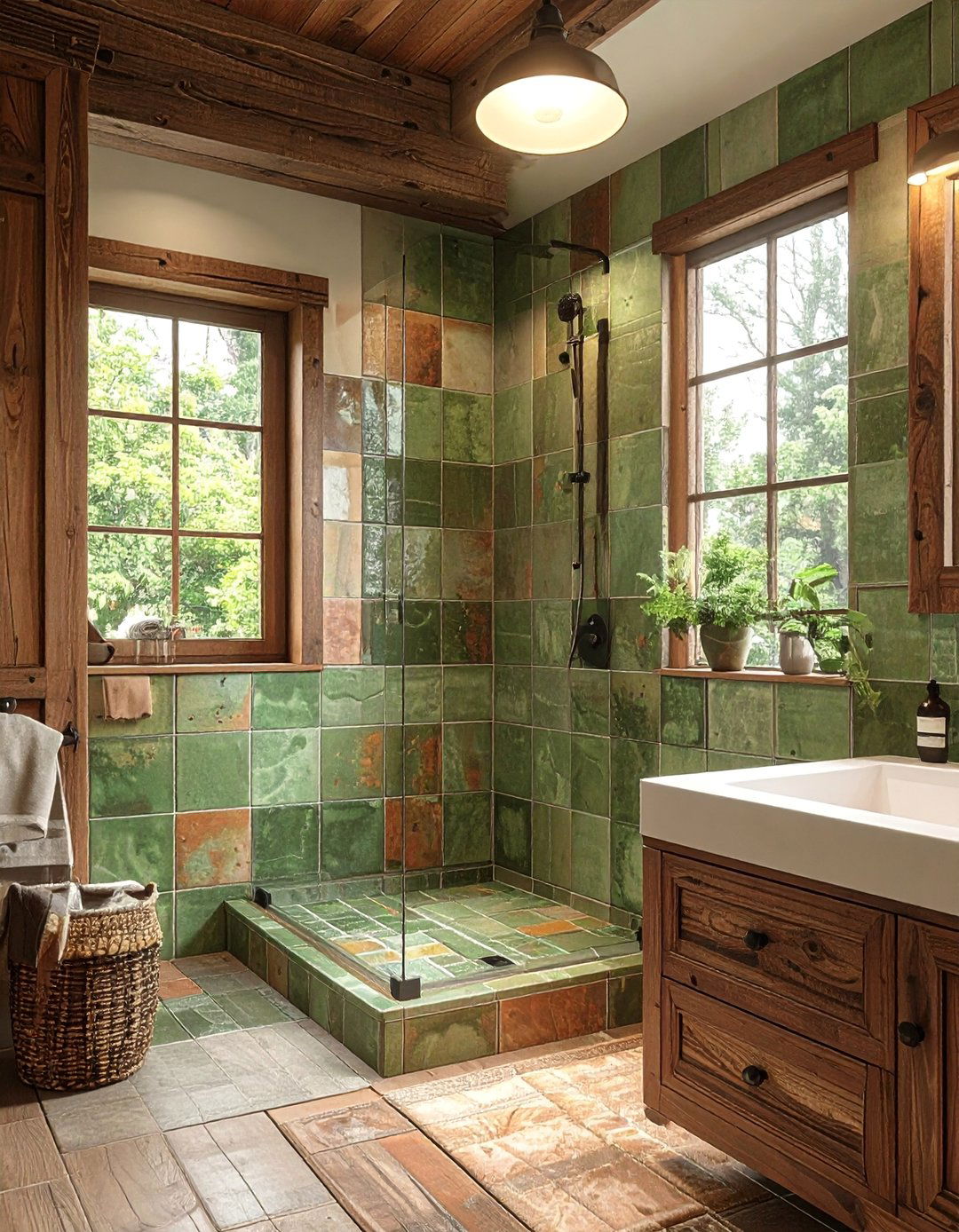
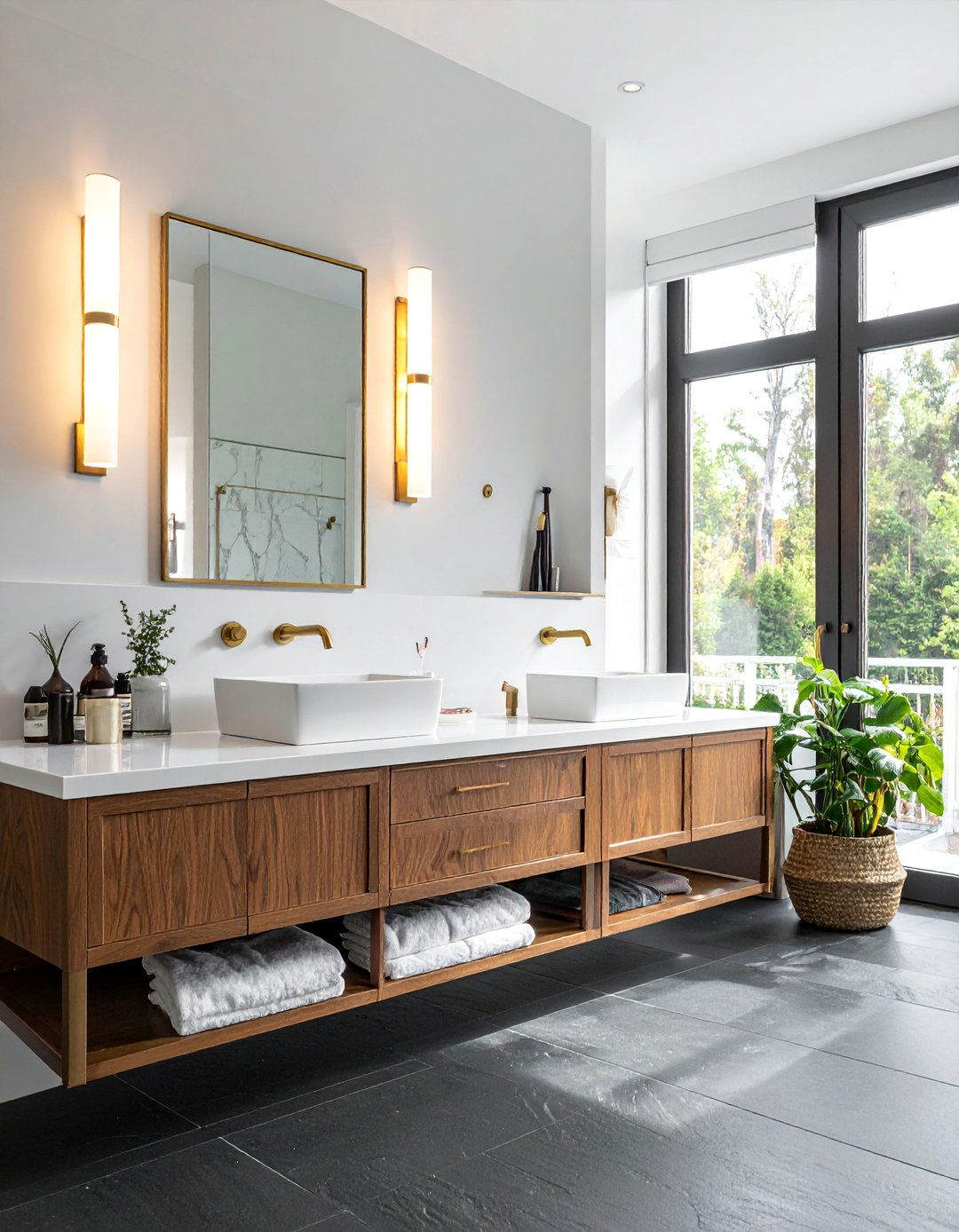
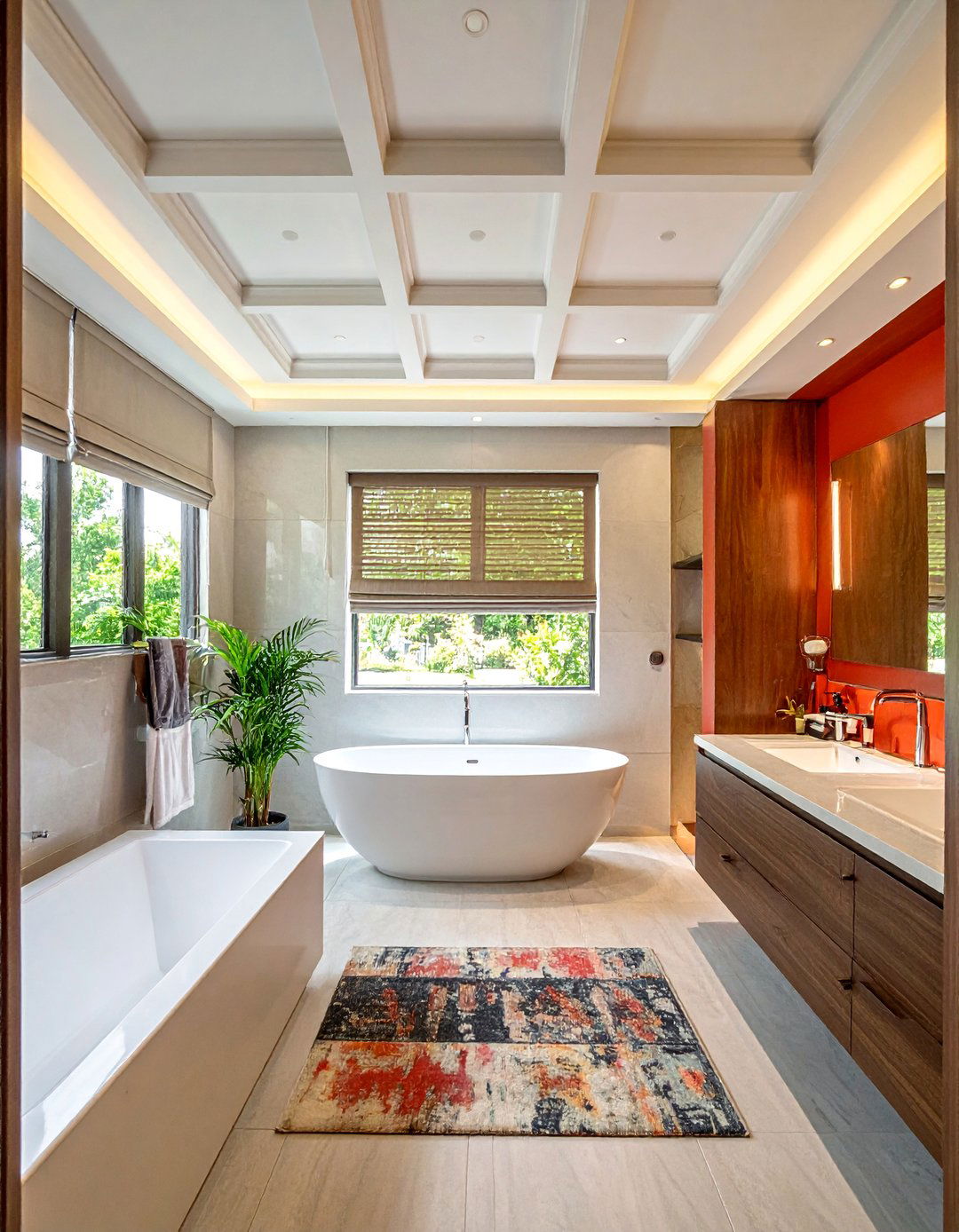
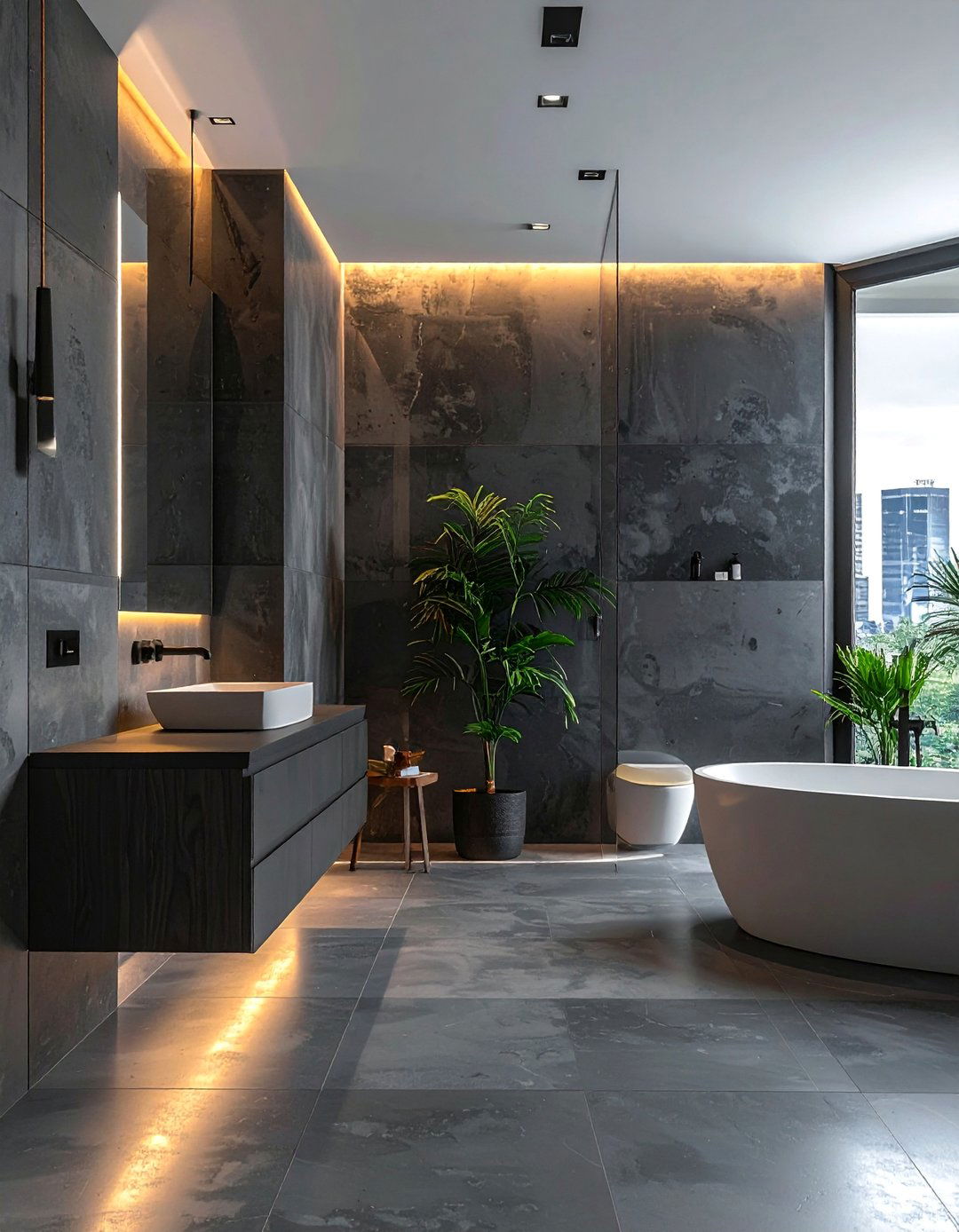
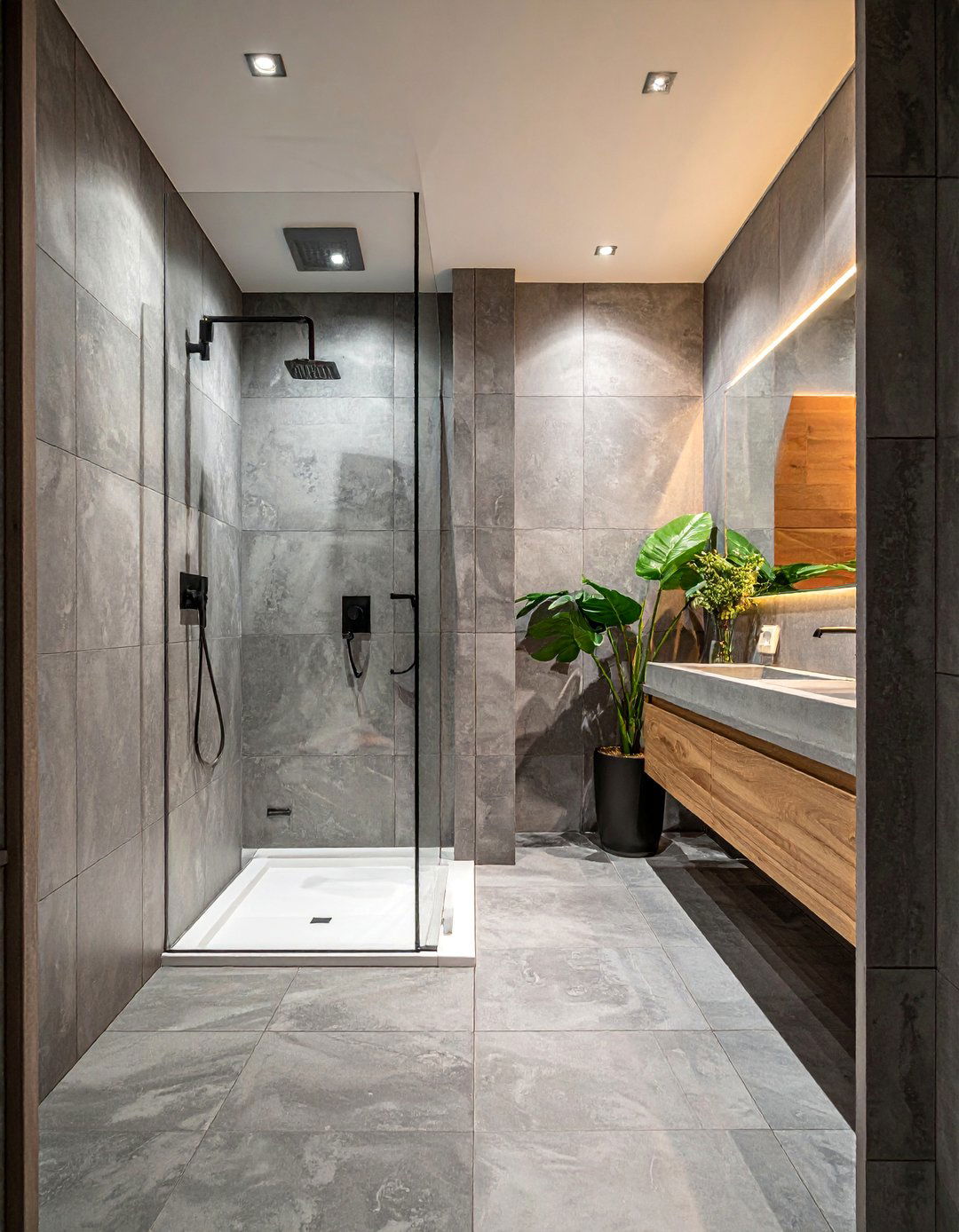
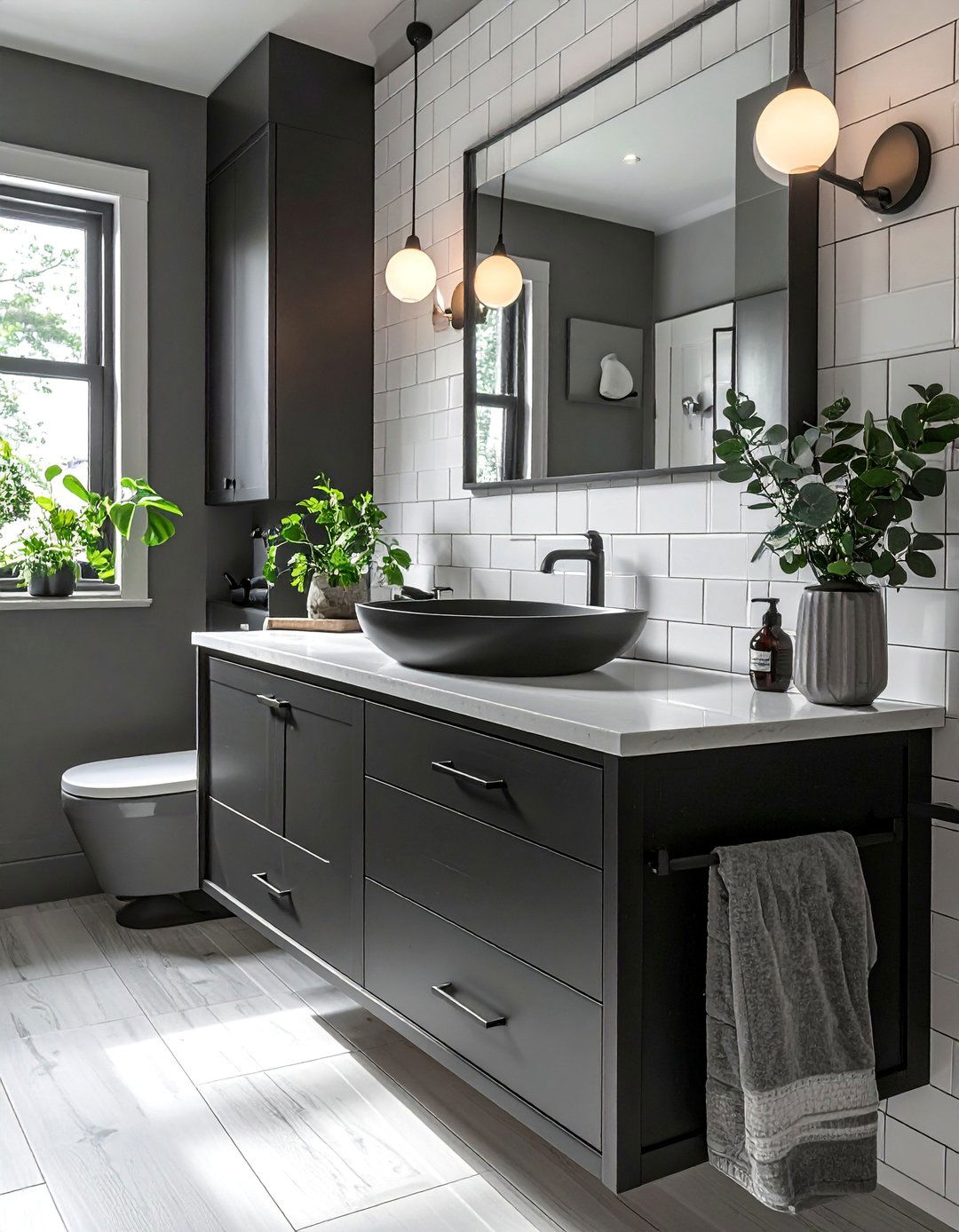
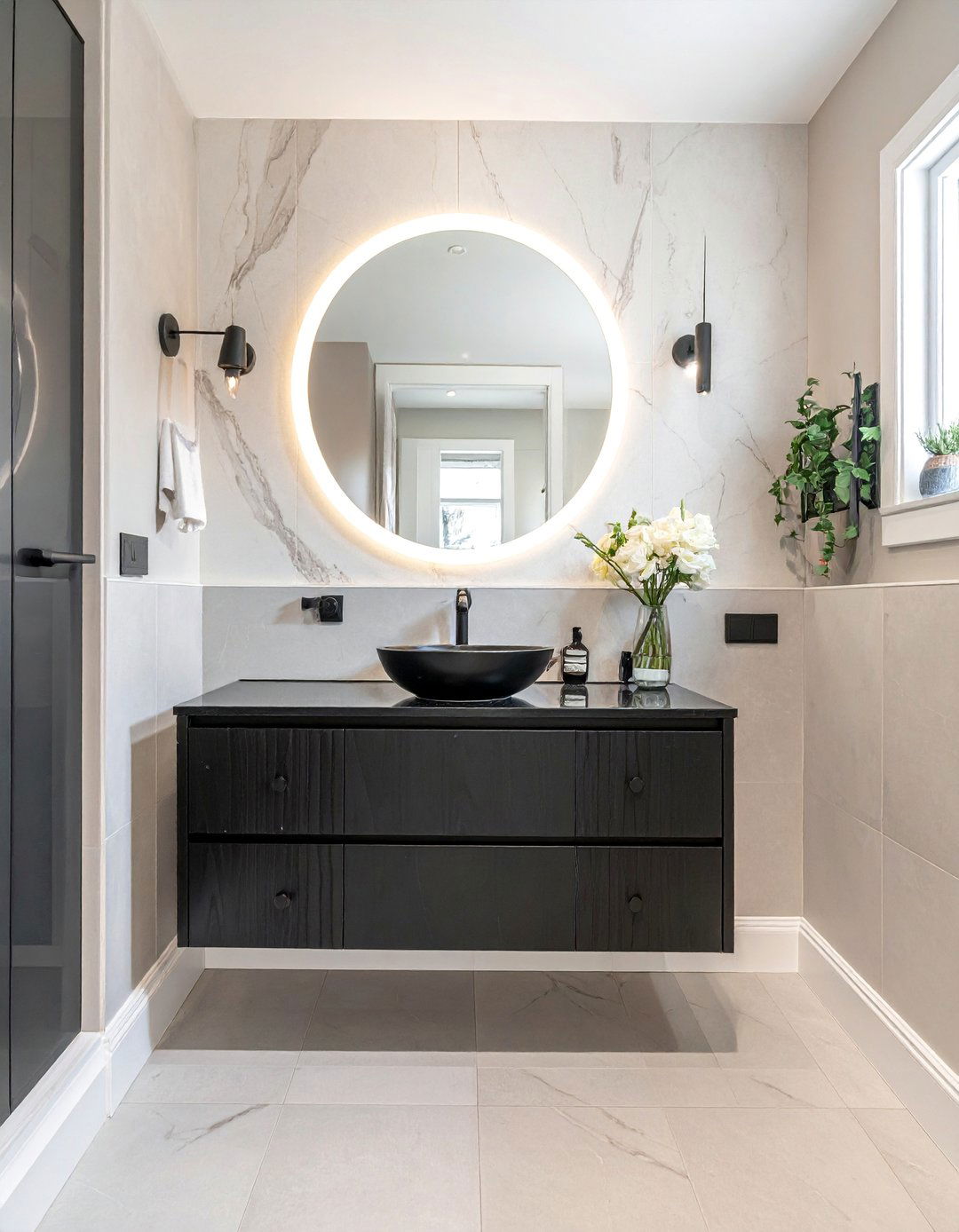
Leave a Reply